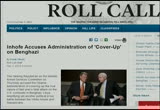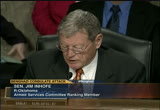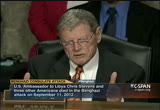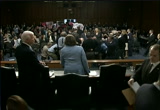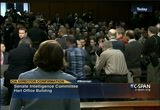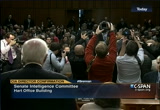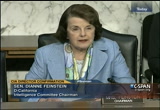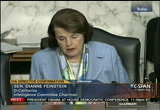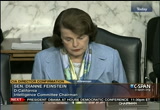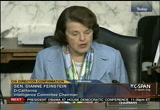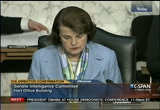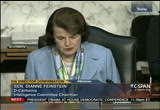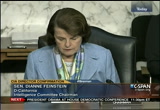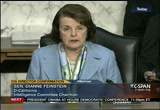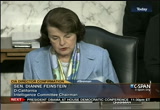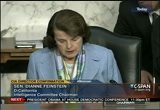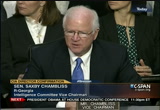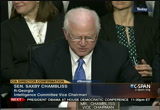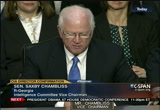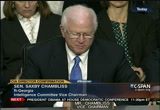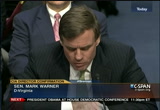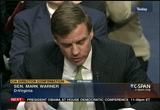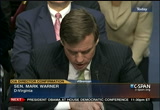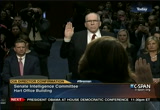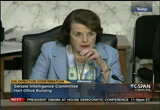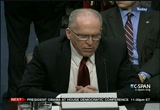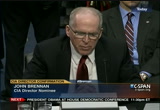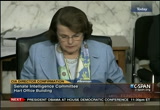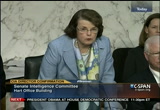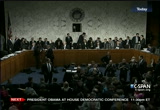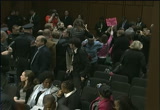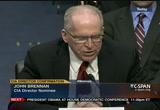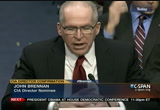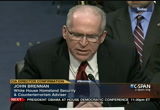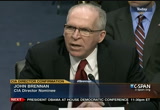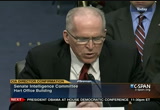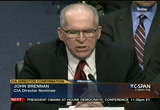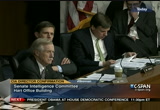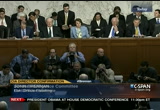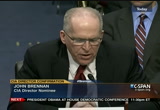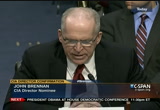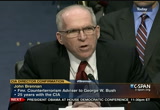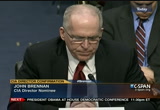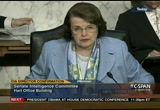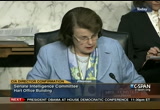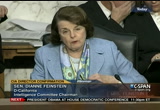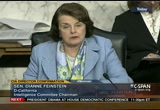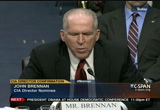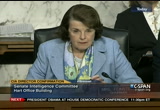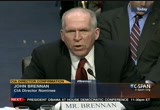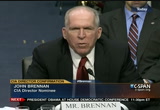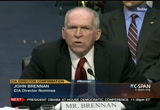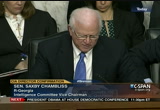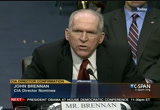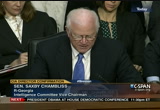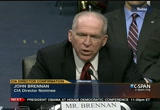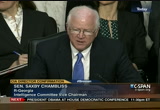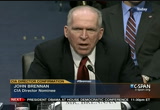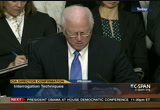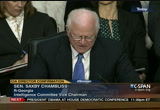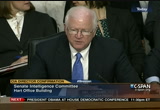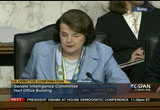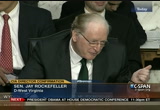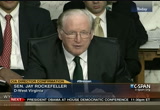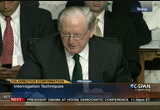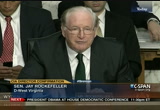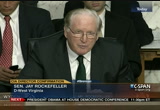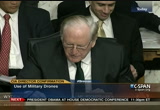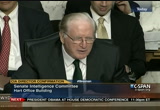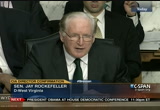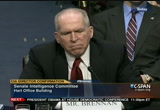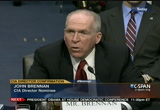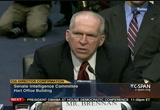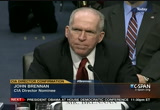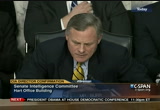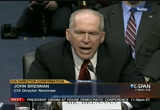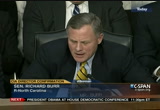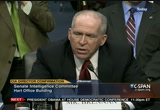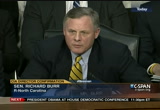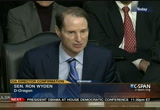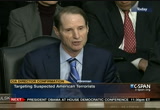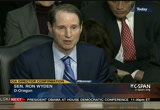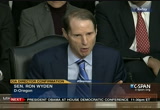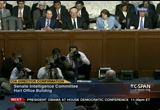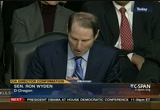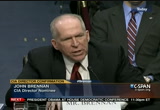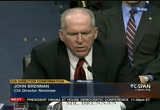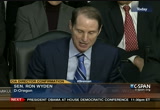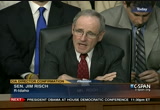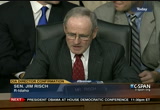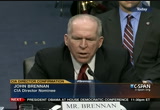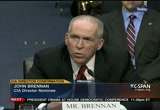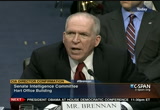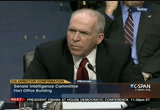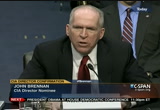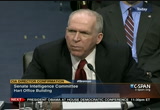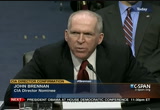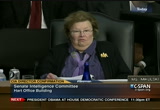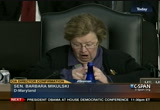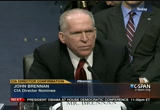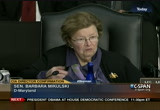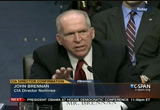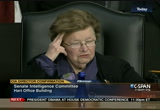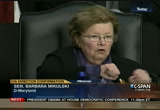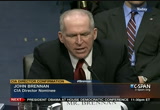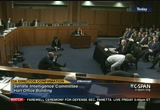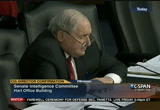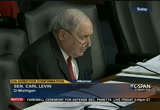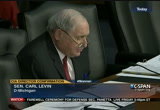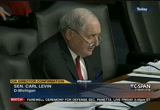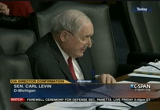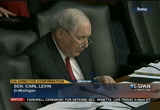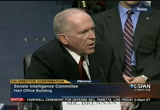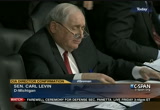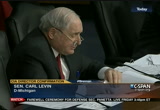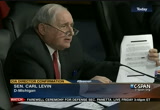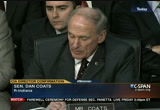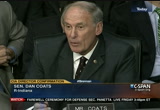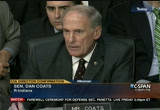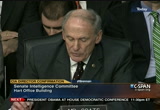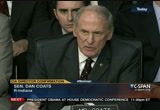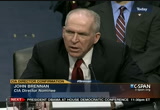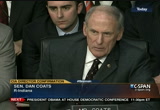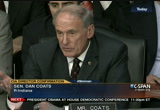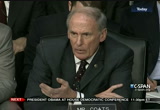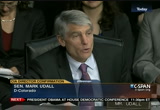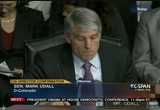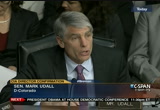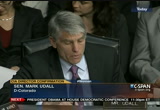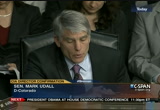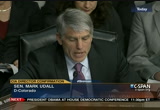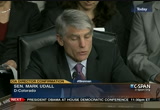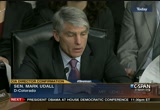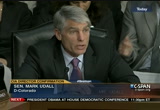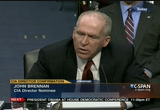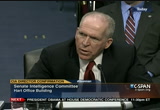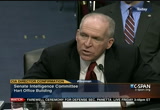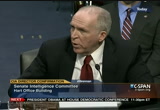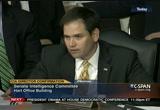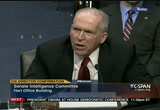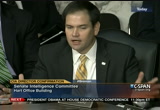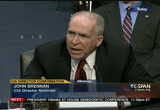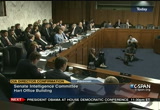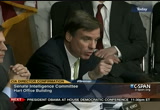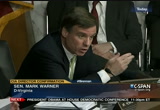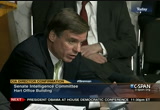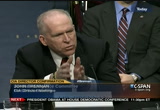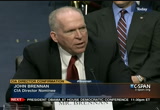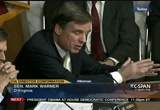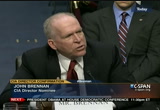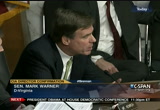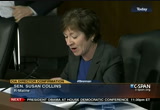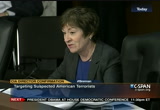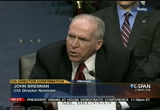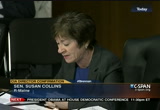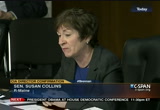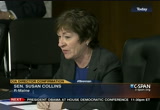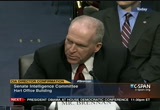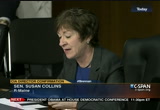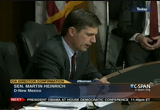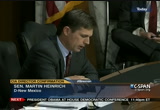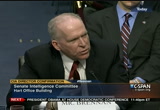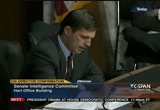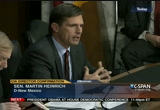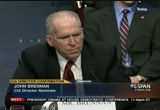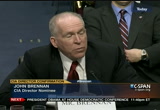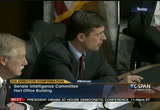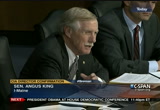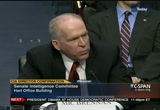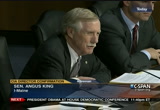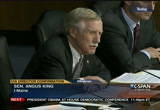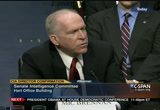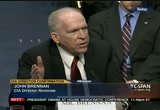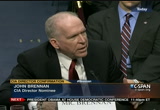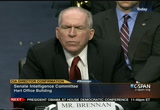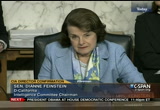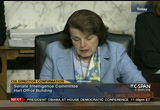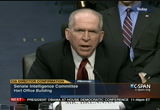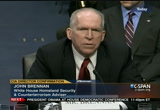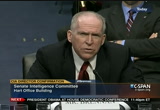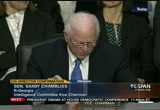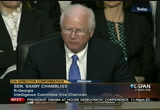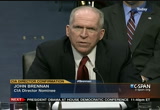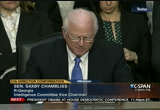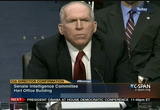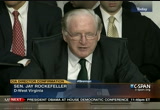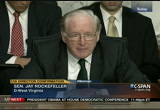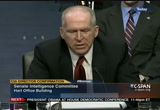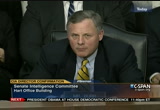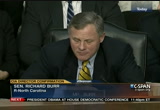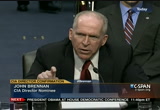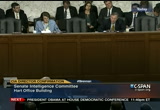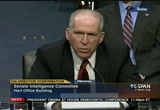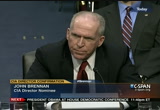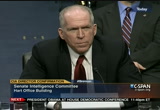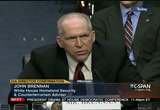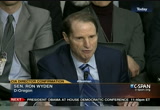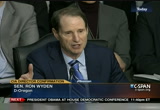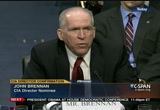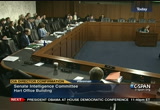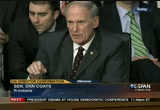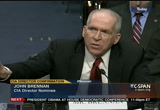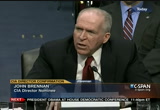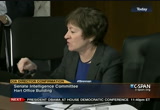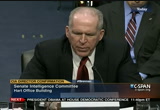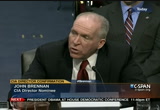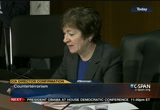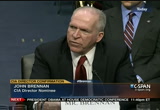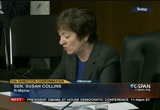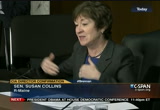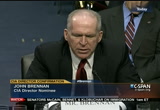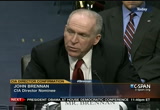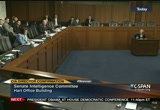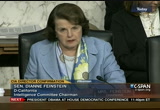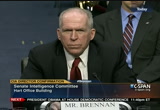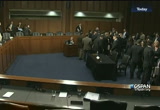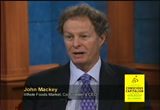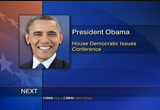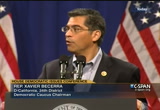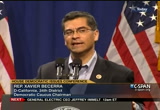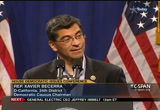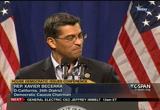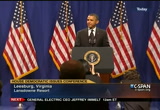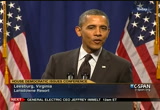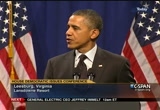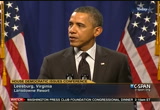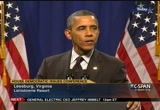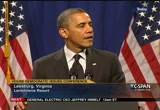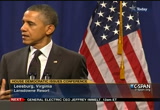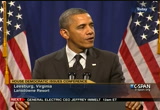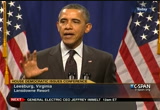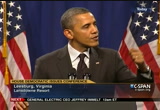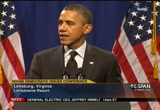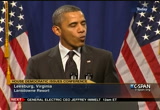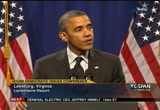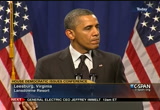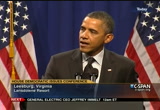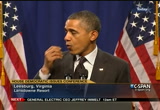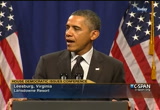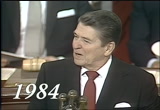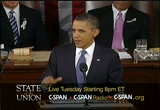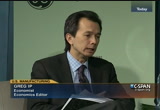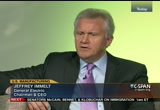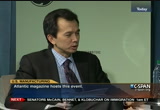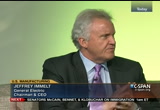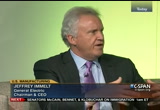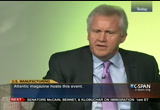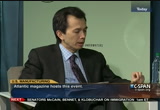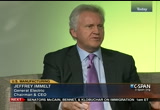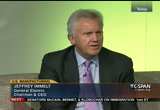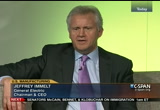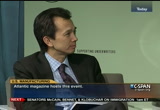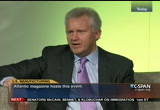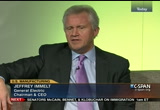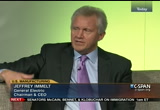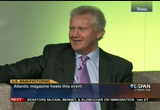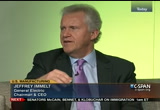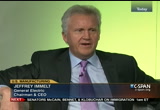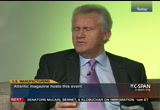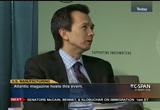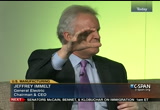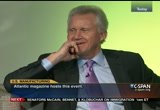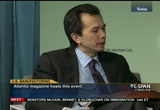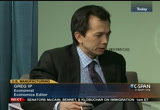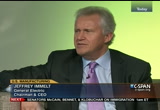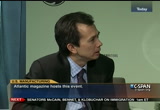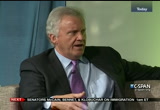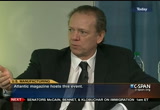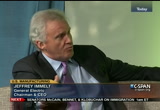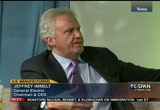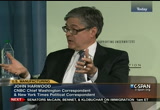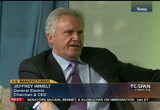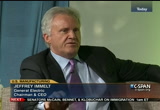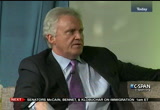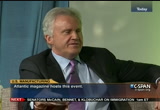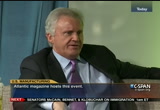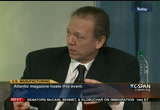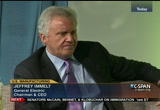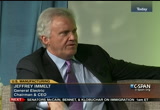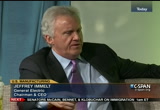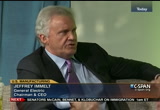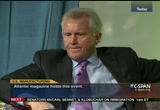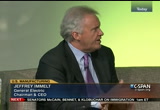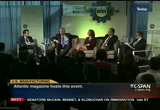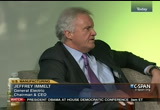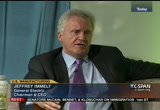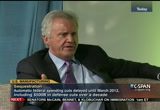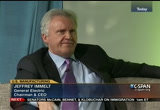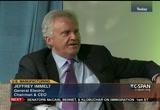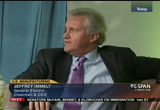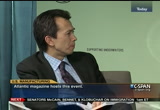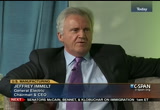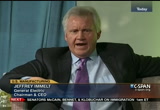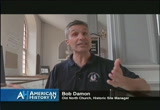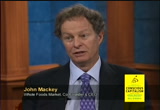tv Capitol Hill Hearings CSPAN February 7, 2013 8:00pm-1:00am EST
8:00 pm
hill hearing. leon panetta and martin dempsey testified about the benghazi attacks attacks. he accused susan rice of lying about the attacks when she appeared on the sunday tv talk shows last september. here is part of the questioning in that hearing. >> chairman dempsey, at the time of the meeting, would you have -- how would you have characterized the attack on the compound? >> i did not know. >> it could have been either one. >> that is right. >> it could have been spontaneous were preplanned. but i have to ask the same question, would you agree that was a preplanned attack? unequivocably? >> at the time, when this was going on, we were not sure was
8:01 pm
taking place. when i later found out that you had rpgs and there was an attack, there was no question in my mind. >> my position would be they knew that at the time because i have talked to several people that have stated they knew it. unequivocably that would have been a terrorist attack. the thing i am getting to come and do you agree that it was a terrorist attack? >> when i appeared before this committee three days afterwards i said it was a terrorist attack. >> that is what the john brennan said. i have to say we have to understand someone has to ask a question. if that was true and we knew all of that at that time, the presentation by susan rice, before all of america, said we have -- the fact was this was
8:02 pm
not a preplanned, premeditated attack. i will not ask you to respond to that but i think it is important people understand that everybody knew on that sunday it was a preplanned, premeditated attack. thank you for your tolerance. >> you can see the rest of the hearing on c-span 2, or in our video library. and tomorrow, a farewell ceremony in honor of leon panetta. president obama and martin dempsey are expected to speak. we will have coverage at 3:45 p.m. eastern on c-span. john brennan, the nominee to the cia, testified today at his confirmation hearing. the topic of drone strikes came
8:03 pm
app. dianne feinstein said she will look into new legislation to govern overseas strikes. there was an interruption by protesters. it is three and a half hours. >> you are a disgrace to democracy. >> if the police will clear the room, please. will clear the room, please. [indiscernible] [shouting continues] >> [indiscernible] please clear the room. >> [indiscernible] please clear the room. [protest continues]
8:04 pm
8:05 pm
process is that people are respectful, that they do not shout, they do not hiss, they do not show signs, that this is to listen. if that is a problem for anybody, i ask you to leave their room now. -- the room now. what we will do is remove you from the room. let there be no doubt. so if i may, i would like to begin. the committee meets today in open session to consider the nomination of john brennan to be the 21st director of the central intelligence agency and the first directly to have risen through the agency's ranks since bob gates. mr. brennan, congratulations on your nomination. i see senator warner has come in. senator, i will make opening comments. then the vice chairman will make his opening comments, and then we will turn to you for your introduction, if that is
8:06 pm
agreeable. mr. brennan, congratulations on your nomination. i would like to welcome your family as well. i hope you will introduce them so the committee can give them its thanks. this is the first opportunity also to welcome our new members senator heinrich is on my right, senator king who is due any moment, senator collins on my left, and senator coburn, who is not here at the moment but who will be, who is returning to the committee. we have a new ex-officio member, senator inhofe. welcome to all of you. the director of the cia is among the most critical national security positions and the united states government. but because of the role the cia plays in collecting and analyzing intelligence relevant
8:07 pm
to every national security challenge we face and because of the added importance of having steady leadership at an organization that conducts most of its business outside of the public arena, intelligence is critical to the successful draw-down in afghanistan, to the brutal war going on in syria, across north africa where the attacks in benghazi and hostage situation in algeria threatened to spread into the next front against al qaeda and its affiliated groups, for counter-terrorism operations around the world, for any efforts by the united states and others to prevent big gains and spread of weapons of mass destruction, in iran, north korea, and other states, and in addressing emerging threats in space, cyberspace, and elsewhere around the globe. to confront these challenges and to lead the cia through a difficult budgetary time, the
8:08 pm
president nominated john brennan. mr. brennan is without a doubt qualified for this position. he served at the cia for 25 years in managerial capacities. he has seen the agency from just about every angle, as a line analyst, as chief of station, as chief of staff to the director, and as deputy executive director among many others. people who have worked close with him regularly cite his work ethic, his integrity, and his determination. in nominating john brennan, president obama spoke of his "commitment to the values that define us as americans." others note his impeccable
8:09 pm
integrity and his dedication to the country is second to none. without unanimous consent, i would like to insert into the record matters the committee has received in regard to brennan's nomination. john brennan by all accounts will be a strong leader, guided firmly by the law and his strong ethical code. he has assured the committee in his response to pre-hearing questions that he will be independent from political influence. he will seek only to provide the president, the congress, and other leaders with his best analysis and advice. his responses to the committee's questions are available on the committee's website. intelligence.senate.gov.
8:10 pm
of course the committee must conduct its due diligence on such an important nominee, some members are going to have questions in a range of topics, including his plans for directing the agency, major national security challenges we face, positions and actions he has taken in his current and past jobs. also of interest will be mr. brennan's the view on the use of targeted force in counter- terrorism operations. mr. brennan has been one of the few administration officials able to speak publicly about such issues. members will certainly want to understand his views on this, but also to include the importance of congress receiving all of the relevant legal analyses and the office of legal counsel at the department of justice. while the disclosure earlier this week of a 16-page unclassified white paper on the government's legal analysis of the use of targeted force against a united states citizen who was a senior operational
8:11 pm
leader of al qaeda, there is finally more information available to the public. i have been calling and others have been calling for, the vice chairman and i, increased transparency on the use of targeted force for over a year, including the circumstances in which such force is directed against u.s. citizens and non- citizens alike. i have been attempting to speak publicly about the very low number of civilian casualties that result from such strikes. but for the past several years, this committee has done significant oversight of the government's knowledge of targeted strikes, and the figures we have obtained from the executive branch, which we have done have confirmed that the number of civilian casualties that have resulted from such strikes each year has
8:12 pm
typically been in the single digits. when i asked to give out the actual numbers, i am told you cannot, and i say why not? because it is classified. it is a covert program. for the public, it does not exist. well, i think that rationale, mr. brennan, is long gone, and i will talk to you about that because i think it is very important that we share this data with people. this committee will continue to perform significant oversight of targeted strikes. we received this morning and office of legal counsel opinion on the topic. actually, we received a short one and a long one, and while i was there i was delighted to see senator wyden reading, senator udall came in the room, and i hope every member will avail themselves of this opportunity to review those
8:13 pm
opinions. i also intend to review the proposals for legislation to ensure that drone strikes are carried out in a manner consistent with our values and the proposal to create a foreign surveillance court. finally i want to know how the nominee intends to lead agency, in which four directors served since 2004 and what he sees as the major challenges. for the information of members, we will have rounds of questions of eight minutes each, and members will be recognized by seniority, alternating between the sides. members have requested the opportunity to ask mr. brennan questions that will require classified answers as well.
8:14 pm
so we have the ability to move to a classified session following this hearing if it is timely and we're able to do so. my suggestion is that we play that ear by ear, mr. vice chairman, and see if it is possible to do so. if it is not, we will have are closed session on tuesday at our next hearing. finally, before turning to the vice chairman, i would like to conclude my remarks the same way i did at the confirmation for general petraeus. again, this time, the transition between cia directors has been managed by acting director michael morell. i would like to thank him for keeping the agency on firm footing and for his agreement to remain as deputy director after the confirmation process. he continues to be a top-notch cia officer, a friend of committee, and i am sure he will be an excellent deputy, mr.
8:15 pm
brennan. mr. vice chairman, please proceed. >> thank you. mr. brennan, i join the chair in congratulating you on your nomination and welcome you to the committee today. i do not have to remind you, because you are a career individual, of the importance of your nomination to head the cia. i also want to welcome your family and thank them for their support of you during your years of commitment to our country. also i want to just say, as determined to it, how much we appreciate mike morell, and i am very pleased to see that in your prepared statements he mentions his contribution to the cia and that you intend to keep mike in place. he is a very valued public servant and a guy who has stepped into very difficult situations now twice and has led the commitment and has
8:16 pm
provided the kind of leadership the agency has needed. mr. brennan, if confirmed as the next director, it will be your responsibility to lead the c.i.a. as our nation continues to face significant national security challenges. while we have heard a lot about al qaeda being decimated and on the run, it is by no means destroyed, and the threat of terrorism from its affiliates remains very real. just in the past few months, terrorist attacks in algeria and benghazi have claimed american lives. it is clear our vigilance must not waver, and at the same time our attention focused beyond these threats posed by al qaeda and other organizations, from iran to north korea to venezuela, from nuclear proliferation to cyber intrusions to counterintelligence, the challenges are constant and immense, and the cia is a point of the spear.
8:17 pm
as your predecessors faced similar challenges, they recognize the importance of working hand in hand with congress, especially the congressional intelligence committees. i appreciated your commitment to me to be open and transparent with this committee if you are confirmed as the next director. i expect this commitment actually be borne out in practice regardless of political pressures and not just become words spoken during that process. far too often the committee is facing unnecessary and frankly legally questionable obstacles can receiving needed oversight information from the intelligence community. as we hear from you this afternoon, i also believe it is important for you to set the record straight on a few matters relating to detention policy and the cia's detention and to the interrogation programs. we know the 2009 order removed the cia from the detention business, but the framework is simply not working to get real-
8:18 pm
time access to intelligence for terrorist detainees. i reviewed the report in preparation for this hearing, and i am concerned that the administration is making the same mistakes that were made before 9/11 when the cia missed vital information on ksm, a mastermind of the attacks. the commission cited the administration must focus on using the article 3 court process as factors in both instances. you and i also discussed the committee's report on the cia's interrogation program which was approved in december. you told me you completed your review of the report of the executive summary and the findings and conclusions, and you will have an opportunity to express your observations and
8:19 pm
concerns that you expressed to meet with the rest at the committee today. i thank you once again for your dedication and your service to our country, and i do look forward to your testimony and your responses to questions submitted by the committee. >> thank you, mr. vice chairman, and now we will turn to the senator from virginia, mark warner. >> thank you, and it is my honor to introduce john brennan as the president's nominee to be the next director of the cia. john now calls virginia home. it has been my privilege as a member of this committee to represent many of the thousands of men and women in our agencies who also call virginia home. i would also make mention of the fact that, since we do not get that many opportunities in front of a public audience, to
8:20 pm
recognize that many of you joined in with us on what we will be introducing this year, a joint resolution to commemorate professionals who keep our nation safe every day. i look forward to working with all of you to make sure we do this resolution again. these same qualities -- dedication, selflessness, intelligence, and patriotism -- are well represented in john brennan, in whom the men and women of the cia will find a dedicated leader in public service should he be confirmed. i have not had the opportunity to work with mr. brennan as much as the other members. i enjoyed our meeting together, and as the chairman has indicated, his long career of public service and his record has prepared him to be director of the cia. he served for 25 years at the
8:21 pm
agency in the field and at headquarters, including as deputy executive director in saudia arabia and as briefer to two presidents since 9/11. he has spent time at the front lines. he has enormous appreciation from the men and women of the cia and the work they do come often in the shadows, to keep our nation safe. one thing i was impressed in our meeting was that mr. brennan has been an advocate for greater transparency in our policy and for adherence to the rule of law. as a member and a member of this oversight committee, i appreciate that. as the president said, the imperative to secure the nation must not come at the sacrifice of our laws or ideals. this needs never be an either/or choice. it is also important to ensure that while we look at the programs of the cia that their
8:22 pm
effectiveness be measured objectively and not by those who are charged with implementing them. the chairman has gone through parts of your background. i want to congratulate you on your nomination, the service you have provided to our nation so far, and in the aftermath of this hearing, the service that you will provide going forward. with that i will come back to the dais to ask my questions. >> thank you very much. mr. brennan, please stand and raise your right hand, and i will administer the oath. i, john brennan, do solemnly swear i will give this committee the truth, the full truth, and nothing but the truth, so help me god. >> i, john brennan, do solemnly swear i will give this committee the truth, the full truth, and nothing but the truth, so help me god. >> thank you very much, and we look forward to hearing your testimony.
8:23 pm
>> chairman, members of the committee, i am honored to be here before you today to be the president's nominee -- [indiscernible] >> will you please stop. please remove this woman. please remove -- [indiscernible] i am going to say once again that we welcome everyone here, that we expect no clapping, we expect no hissing, we expect no demonstration in this room.
8:24 pm
this is a very serious hearing. i will stop the hearing and i will ask the room to be cleared. so know that. please continue. >> thank you. i am honored to be appear before you today. i am grateful to the president for the confidence he has placed in me by sending my name forward to the senate for consideration. senator warner, thank you for your introduction and for your strong support for those who defend it. this includes the extraordinary men and women of the cia, many of whom call virginia home and call you their senator. i would not be here today without the love and support of my wife kathy, who has been my life partner for 35 years and who, like the spouses and other servants, and professionals, numerous sacrifices of the--
8:25 pm
[indiscernible] >> would you pause, mr. brennan. would you remove that person, please, as quickly as you can. thank you. [indiscernible] >> mr. brennan, please proceed. >> who has made numerous sacrifices of the years, bearing the brunt of responsibilities because of my profession. i would like to pay tribute to my three children who have had to deal with it disappointments associated with an absentee parent more often than they should, and i am pleased to be joined by my wife kathy and my brother tom. [indiscernible] >> i speak for the mothers in
8:26 pm
yemen, pakistan,>> all right -- [indiscernible] >> the obama administration refuses to tell congress. we are killing children. senator feinstein -- >> senator feinstein -- [indiscernible] do your job. we are making more enemies. >> please proceed. mr. brennan, the next time we will clear the chamber and bring people back in one by one. this witness is entitled to be heard, ladies and gentlemen, so please give him that opportunity. >> thank you. i thank you on behalf of my family in new jersey, especially my mother -- [indiscernible] who emigrated from ireland 65
8:27 pm
years ago. >> i have a list with all of the names -- >> all right, which are run to halt the hearing. i am going to ask that the room be cleared and that the code pink associates not be permitted to come back in. it has been done five times now, and five times is enough. so we will recess for a few minutes. [applause] [indiscernible] all right. ladies and gentlemen, if you would mind leaving, we will then have you come back in, but it is the only way i think we are going to stop this. we will recess for a few minutes.
8:29 pm
8:30 pm
i was talking about my parents. my mother, my father, who raised my sister, brother, and i, who shared the opportunity known as america. i would like to extend a salute to david petraeus who remains one of the staunchest advocates of the agency's mission. i want to express my admiration for my close friend mike morell, who has guided the cia with a steady hand and exceptional skill. if confirmed it would be a privilege for me to work side by side with michael, my friend, in the months and years ahead. it would be a tremendous privilege to serve with the director of national intelligence james clapper, who has led legions of intelligence professionals. jim is a person of longstanding and deep experience and integrity.
8:31 pm
he and i share identical views on the role of intelligence and the importance of giving current and future generations of professionals the support they need and that they deserve. it would be the greatest honor of my professional life to lead the women and men of the cia, the agency where i started my career for a quarter century. a 24-year-old, i arrived at langley in 1980 at langley, a gs9 trainee, determined to do my part. when i joined the cia, world events were unsettled. our embassy in tehran had been overrun the year before and 52 americans were still being held hostage by government in iran. the soviet invasion of afghanistan was less than a year old, and in the next decade we witnessed the crumbling of the
8:32 pm
soviet union. nuclear proliferation and the spread of weapons of mass destruction were a constant concern, and u.s. officials were working hard around the globe try to prevent regional tensions and animosities from turning into a full-scale war. and ominously, the united states was about to face an upsurge in terrorist attacks that claimed hundreds of american lives in lebanon, including a cia officer known as bob ames who was my boss. watchedy career, i've up close and participated in history being made in far off corners of the world, as it collected intelligence, uncovering secrets, identified threats, partnering with foreign services, analyzing the elements abroad, carrying out actions, and attempting to forecast events that happened,
8:33 pm
all in an effort to protect our people and to strengthen america's national security. throughout my career i have had the great fortune to experience firsthand as well to witness what it means to the cia officer, such as an analyst who has the daunting task in responsibility to take incomplete and contradictory information and advise the senior most policy makers about government about a foreign, political, and economic developments, or an operations officer, whose job it is to find and obtain those elusive secrets to provide advance warning and strategic surprise, impending violence, cyber attacks and a persistent threats such as nuclear, chemical, and biological weapons proliferation, or a technical expert, who finds nuggets of intelligence in tremendous volumes of data, provides secure data collection and systems and encountered the latest threats to our nation, or a support officer whose
8:34 pm
responsibility is to provide analysis and when directed by the president, conducting covert action and carried out with the provision speed, skill, and efficiency. and from sub-saharan africa to central and south america to the vast expanses of asia and the great cities of europe and all countries in between, cia officers were there, sometimes in force and sometimes virtually standing alone. and for those 25 years, it was a great honor for me to be a cia officer, as i knew that this country's contributions to security rise in valuable as they were innumerable. following my retirement from the cia in 2005, i had the good fortune to experience other opportunities. for three years, i served as ceo of a private-sector
8:35 pm
company, where i learned firsthand about fiduciary responsibilities and sound business practices. and for the past four years and i have had the privilege to serve as the president's principal policy advisor on homeland security and counterterrorism. i have had the opportunity to work with some of the finest americans i have ever met. in the intelligence, military, law enforcement, and diplomatic communities, who have dedicated their lives to the safety and security of fellow americans. it is because of the work of those americans serving domestically, and especially those serving in dangerous places abroad, that we are able to enjoy the freedom and security that are the hallmarks of our nation. i believe my background and experiences have prepared me well to lead the premier intelligence agency in the world at this moment in history, which is as dynamic inconsequential as any in recent decades and will continue to be in the years ahead.
8:36 pm
simply stated, the need for intelligence and the cia has never been greater than it is in 2013 or will be in the coming years. historical political and social transformations continued to sweep through the middle east and north africa. israel's security and our arab partners and our prospects for peace throughout the region. we remain at war with al qaeda and its associated forces. they still seek to carry out deadly strike against our homeland, our citizens, and our friends and allies. international criminal organizations, said national grids, and individual hackers and the regime in tehran and yawning remain bent on missiles systems -- and p'yongyang remain bent on missile systems rather than meeting the needs of their people.
8:37 pm
yes, the cia is as important to our nation's security today at any time in our nation's history. in carrying out their missions, the men and women of the cia are frequently asked to take challenging, perilous, and controversial actions on behalf of the american people. the cia is not immune from the scrutiny of these efforts, and i welcome a discussion of the cia's past and present activities. if i am selected, i've welcome an investigation of the interrogation techniques. i read the report that raises a number of serious issues. given the gravity and importance of this subject, i look forward to a report on the committee's findings if i am confirmed. in addition, some of our government's counterterrorism policies and operations have
8:38 pm
sparked widespread debate, domestically, internationally, and in this room. i have publicly acknowledged that our fight against al qaeda and its associated forces have sometimes involved the use of lethal force outside the hotbed battlefield of afghanistan. accordingly, it makes sense that there is interest in the legal basis as well as that threshold, criteria, processes, procedures and reviews of such actions. i have strongly promoted reviews of such actions with the congress and the american people, as i believe our system of government and our commitment to transparency demands nothing less. as the elected representative of the american people and as members of this committee, you have the opportunity to oversee elements of the cia and the intelligence community to ensure that they are being carried out lawfully and without regard to partisanship. if confirmed, i would endeavor to keep this committee fully
8:39 pm
and currently informed, not only because it is required by law, but because you can either perform your oversight function, nor support the mission of the cia if kept in the dark. another will be occasions when we disagree, just as you disagree among ourselves at times on aspects of past, current, and future activities of the cia. such disagreement is healthy and a necessary part of our democratic process. but such disagreements should never prevent us from carrying out our national security and intelligence responsibilities, as a failure to do so could have devastating consequences for the safety and security of all americans. i have heard repeated references to the trust deficit that has at times existed between this committee and the cia. if i'm confirmed, the address the deficit between the committee and the cia would be wholly unacceptable and i would make it my goal on day one of my tenure and every day thereafter to strengthen the
8:40 pm
trust between us. i have a reputation for speaking my mind, and at times doing so in a direct manner, which some attribute to my new jersey routes. -- roots. i would like to think that my candor would reassure you that you'll get straight answers from me, maybe not always those you will like, but you will get answers and they will reflect my honest views. that is the commitment i made to you. i would like to finish by saying a few words about the importance of taking care of the women and men who serve in the cia. because the of the secretiveness that the intelligence work requires, few americans will ever know the making sacrifices that these professionals and their families make every day. many have risked their lives and at times have given their lives to keep our country states. -- safe. if confirmed, i would make our mission in partnership with the congress to make sure that the men and women have the trade craft, training, linguistics skills, is to provide an -- supervision and guidance to do their jobs.
8:41 pm
these leaks of classified information damage our national security, it sometimes greatly, putting cia employees at risk in making their mission is much more difficult. the men and women of the cia are a national treasure. i will consider it one of my most important responsibilities to take care of them, just as others took care of me when i first arrived as a young trainee at langley in 1980. as members of the committee come out as you all know, when you ride at langley, you immediately see the memorial wall. on it are stars, each one representing a member of our family who gave their life for this nation. to me, and everyone at the cia, they're not simply stars, nor are the only visible remembrances of do they departed -- dearly departed
8:42 pm
colleagues and friends. the stars represent heroic and unsung patriots, americans who have lived their lives with dedication. i want america to be proud of all our activities. i would take it as a sacred obligation to do everything in my ability to make sure that the central intelligence agency is the best intelligence service it can be and one that makes all americans proud. thank you, and i look forward to taking your questions. >> thank you, mr. brennan. i have five short questions that we traditionally ask. if he would just answer that yes or no. do you agree to appear before the committee here or in other venues when invited? >> yes.
8:43 pm
>> do you agree to send officials from the cia and designated staff when invited? >> yes. >> do you agree to provide documents or any other materials requested by the committee in order for it to carry out its oversight and legislative responsibilities? >> yes to all documents that come under my authority as director of the cia. >> we will discuss that later. will you provide material to the committee when requested? >> yes. >> do you agree to fully brief to the fullest extent possible all members of this committee of intelligence activities and covert actions, rather than just the chairman and vice- chairman? >> yes, i will endeavor to do that. >> will now go into eight- minute rounds, and we will do it by seniority and alternate from side to side.
8:44 pm
i wanted to talk about for a moment the provision of documents. senator wyden and others have had much to do about this. our job is to provide oversight, to try to see that the cia and intelligence communities operate legally. in order to do so, it is necessary to understand what the official legal interpretation is. the office of legal counsel opinions becomes very important. we began in the bush administration with mr. bradbury to ask for olc opinions. up until last night, when the vice-president called vice chairman widom and myself and said that they were providing the olc opinions, we have not been able to get them. it makes our job to interpret what is legal or not legal much more difficult if we do not have those opinions. staff has asked for eight
8:45 pm
additional opinions. what i want to know is whether you will become our advocate with the administration so that we can obtain those opinions? >> law requires the heads of intelligence agencies to provide the committee with documentation on covert action. i have been an advocate of that position and will continue to be. >> i take that as a yes, and i'm counting on you to provide eight olc opinions. my next question is this. when the opinions can overcome our staff was banned from seeing it. we have lawyers and very good staff. this is upsetting to a number
8:46 pm
of members. when we depend on our staff. you cannot take material home. you cannot take notes with you. staff becomes very important. you happen to know the reason why our staff is not permitted when we are permitted to see an olc? >> i understand fully your interest in having your staff see the documentation. it is fully understandable. the reason for providing information just to the members at times is to ensure that it is kept on a limited basis. it is rather exceptional, as i think you know, that the office of legal counsel advice would be directly shared with you. i think this was determined because of the rather exceptional nature of the issue and the genuine effort to try to meet the committees requirements. i understand your interest in having the staff -- >> if you would relay the request officially, we would appreciate that. >> absolutely, i will.
8:47 pm
>> when we talked about the report on interrogation and the tension, the 6000-page report, i asked that you please read it. you said you would. you said that you would for sure reedy 300 page summary. -- read the 300 page summary. have you done so? >> i have read the first part, which is 300 pages. >> let me ask a question. were the eit's key to the takedown of osama bin laden? >> the report remains classified. there clearly were a number of things, many things that i read in that report that were very concerning and disturbing to me. and one that i would want to look into immediately if i were to be confirmed as cia
8:48 pm
director, the talked-about mismanagement of the program, providing inaccurate information, and it was rather damning in a lot of its language as far as the nature of the activities carried out. i am eager to see the agency's response to that report. i read those 300 pages. i look forward, if confirmed, to reading the entire 6000 page volume, because it is of importance. i do not have, nor does not -- has the cia reviewed this information completely. that was done over an extended time frame. a tremendous amount of work has gone into it. based on the documentation available, there were not interviews conducted with cia officers. i look forward to hearing from the cia on that and coming back to this committee and giving
8:49 pm
you my full and honest views. >> thank you. you'll have that opportunity, i assure you. i would like to ask you about the status of the administration's efforts to institutionalize rules and procedures for the conduct of drone strikes, in particular, how you see your role as cia director in that approval process. >> chairman, as this committee knows, and i'm sure wants to continue to protect certain covert action activities, let me talk generally about the counter-terrorism program and the role at cia, and its effort to try to institutionalize and ensure we have as rigorous a process as possible. we feel we are taking the
8:50 pm
appropriate actions at the appropriate time. the president had insisted that any action we take will be legally grounded, will be thoroughly anchored in intelligence, will have the appropriate approval process before any action is conflict -- contemplated, including any action that would involve the use of lethal force. the different parts of the government involved in this process are several agencies and my role has been to orchestrate this process to ensure that any actions we take fully comport with our law and meet the standards that this committee and the american people expect of us. at the same time, ensuring that we do everything possible before we need to resort to lethal force. >> mr. brennan, the 9/11 commission report describes a cancelled 1998 cia operation to
8:51 pm
capture osama bin laden using travel groups in afghanistan. the former cia unit told staffed by you directed them to cancel that operation. he says, following a meeting that you had with director tennant and others, that you said the operation should be cancelled in favor of a different approach described by the 9/11 commission as an all out secret effort to persuade the taliban to expel bin laden. as we know, bin laden was not expelled. three months later, his wrath was unleashed with an attack on our embassies. did you advise director tenant against this operation? and if so, why?
8:52 pm
>> i had a conversation with george and that at the time. every single cia manager, george tennant as deputy director of operations at the time, and other individuals at the counter-terrorism center argued against that operation as well because it was not well grounded in intelligence, and its chances of success were minimal. and it was likely that other individuals would be killed. when i was involved in those discussions, i provided the director and others my professional advice about whether i thought that operation should go forward. i also was engaged in discussion with the saudi government at the time. and i encouraged certain action to be taken to put pressure on the taliban as well as bin laden. >> i take it that your answer to my question is that you did advise in favor of the cancellation of that operation.
8:53 pm
>> based on what i had known at the time, i did not think it was a worthwhile operation and i did not begin had a chance of success. >> the 9/11 commission noted that no capture plan before after 9/11 never obtained the same level of possible capture. >> the chances of success for minimal. i was not in the chain of command at that time. >> as deputy executive director, you receive the daily updates of capture, including techniques of interrogation and waterboarding, were used. we found 50 memos in the
8:54 pm
documents within the 6000 pages on which you were copied. what steps did you take to stop the cia from moving to techniques that you now say were objectionable at the time? >> i did not take steps to stop the techniques. i was not in the chain of command. i had the responsibility for overseeing the management of the agency and its various functions. i was aware of the program. i was copied on some of those documents, but i have no oversight of its. i have expressed my personal objections to some agency colleagues about such things as waterboarding and others, but i did not try to stop it because it was something being done in different part of the agency under the authority of others.
8:55 pm
it was something that was directed by the administration of the time. >> you say you expressed your concern to other colleagues. did you ever expressed your concern to john mclaughlin, executive director, or any of the other cia leaders? >> i had a number of conversations with my agency colleagues on a broad range of issues during that timeframe. we would have personal conversations. >> my reason for naming those individuals, mr. brennan, is that they are those directly above you. mr. mclaughlin has been in the press saying that he never heard from you. we have not seen anybody who has come forward saying they ever heard any objections from you with respect to these programs. moving on, your boss at the cia said you had a role in setting the parameters of the program
8:56 pm
and in helping to see justice department approval for the techniques. he went on to say that you would have been part and parcel of the process. how does that reflect on your statement that he played no role in the programs in its creation or oversight? >> i respectfully disagree with my colleague. i was not involved in establishing the program. i think in that same article he goes on to say i was not involved in a lot of elements of that program. i was not involved in the establishment of that program. i had awareness that the agency was going forward on it. i had visibility into some of the activities there, but i was not part of any type of management structure or aware of most of the details. >> why would you be the recipient of a minimum of 50 e- mails on the progress of the
8:57 pm
interrogation as well as the techniques used? >> i was copied on thousands upon thousands of e-mail distributions as a deputy director. i know of no action that was taken to authorize any thing. >> mr. krongard says he discussed with you a changing of techniques. >> i do not recall a conversation with him about changing techniques. >> when you reviewed the information after the interrogation, did you think the and permission was valuable? -- information was valuable?
8:58 pm
>> it was clearly my impression that there was valuable information coming out. >> in in november, 2007 interview, you said that information from the interrogation techniques "save the lives." but you also said that cia should be out of the detention business. the main intervention i saw was the ability to interrogate individuals about being terrorists, but not necessarily evidence that could be used in the court of law. in your view seems to be that even if we could detain more terrorist and save lives using traditional techniques, it would be better to let them go rather than to retain him. can you explain the logic in that argument? >> we want to retain as many as possible, so we can elicit intelligence from him inappropriate manner.
8:59 pm
-- in an appropriate manner. i am a strong proponent to do everything possible, short of killing terrorists, bringing them to justice, and getting the intelligence from them. i clearly had the impression in 2007 that there was a valuable intelligence that came out of those interrogation sessions. reading the reports of these committee, raises questions about the impression i had at the time. now i have determined that based on an information as well as what the cia says what the truth is. and at this point, i do not know what the truth is. >> how many targets have been captured during your service with the administration? >> there have been a number of individuals captured, arrested, detained and interrogated, the brief, and put away by our partners overseas. we have provided them the
9:00 pm
intelligence. when a lot of these countries were both unwilling and unable to do it, we have given them that opportunity. that is when we are working with that is when we are working with our partners. trex how many high-value targets have been arrested and interrogated and detained by the u.s. during your four years with the administration? >> i will be happy to get those numbers to you, in terms of those high-value targets. >> i submit the answer to that is one. and it is the man who was put on a ship for 60 days and interrogated. thank you. >> i will point out that i will try to enforce the minutes. if you hear a tapping, is not personal. senator rockefeller? >> thank you, madam chair. welcome, mr. brennan. if confirmed, you will lead an
9:01 pm
extraordinary agency with extraordinary people who perform extraordinary services, most of them totally unknown by the american people. most people do not think about that. most of us in public service want everything we do to be known. it is how we got elected. it is very different than the central intelligence agency and i respect it very much. i want to move from ieit to the enhanced interrogation techniques. you talk about the 6000 pages. i will pour out my frustration
9:02 pm
on dealing with the central intelligence agency and various administrations trying to get information. why was it they felt we were so unworthy of being trusted? why was it they were willing to talk to pat roberts, me, saxby chambliss, dianne feinstein, but not anybody else? until we literally bludgeoned them, diane and i, to include everybody. it is amazing. i pursue dianne feinstein's statement about staff. under the previous administration, when you have a briefing with the president or the vice president and the cia and others, you are not allowed to -- i can remember when pat roberts was the chairman and i
9:03 pm
was vice chairman, we were not allowed to talk to each other driving up and driving back. staff were allowed to do nothing. you are surrounded by people who work with you and fill you in. people who are experts. we are, too. they've got to be part of this. when the olc comes, it should come to them also. i strongly agree with the chairman's views on that. in the enhance interrogation techniques matter, a handful of former cia officials who were personally invested in defending the interrogation program, largely because their professional reputations depend on it, i think it does a great disservice to discuss this issue.
9:04 pm
you understand that this took six years to write, not just 6000 pages. perhaps longer. 30,000 footnotes. why did we do this? we did this because we have heard nothing from the intelligence agency. we have no way have been briefed. they would not tell us what was going on, so we had to do our own investigation. and we are pretty good at it. when you read the first 150 pages, you told me you were shocked at some of what you read. you did not know that. that, to me, it's shocking. that has to be fixed and changed forever. there never can be that kind of situation again where we have to tell you what is going wrong in your agency, and dust demoralizing some of the people
9:05 pm
in your agency who want to be relieved of the burden of bad techniques in interrogation. they suffer from that. but nobody would talk with us about that. we had to get that information on our own. it is a magnificent piece of work. it will go down in history, because it will define the separation of powers as between the intelligence committees in the house and senate, and the agency and others that relate to it. i am also very aware that this is all crucial to the president's authority, not just on the more modern question of the day about drones. that determination is made by one person and one person alone. if there's a breakdown in protocol, a breakdown in the line of command and reacting into something that is not good,
9:06 pm
something where there's too much collateral damage -- i agree with the chairman when she said that the work of the drowned -- of the drone had been fairly safe, however any collateral damage is unacceptable. this detention and interrogation program, i've got to say that the people who ran it were ignorant of the topic, executing without relative experience. management and senior officials did not pay attention to details. and corruption by personnel showed peculiar conflicts of interest. it was sold with grossly inflated claims of professionalism and so-called lives saved. it was a low place in our
9:07 pm
history. this document should change that forever. if you are confirmed, which i hope you will be, i hope that you'll make parts of this required reading for your senior personnel, so they can go through the same experience that you went through. are you willing to do that? >> yes, senator. i am looking forward to taking advantage of whatever lessons come out of this chapter in our history and his committee's report. >> how do you cross reference? tell me when i'm out of time. >> 8 seconds. >> no, one minute and eight seconds. >> yes, a long time. >> cross reference the eit disaster and the future of the drone. only the president can authorize that, but sometimes the decision
9:08 pm
has to be passed down and in a very accurate manner. and there has to be a protocol, which is more exact even then the to it -- the interrogation techniques. that is beginning to be straightened out. the protocol of that in so far as that particular agency will have to be directed with particular excellence and exactitude. how will that happen? >> you make an excellent point. i'm interested in finding out what went wrong in the system if this report is accurately stated.
9:09 pm
what went wrong in this system where there was mismanagement or inaccurate information put forward? there are covert activities taking place today under the direction of the cia. i would submit to this committee that all of this covert actions and programs are being run effectively. the measures of effectiveness are an accurate and fair representation of what is actually happening. this report raises serious questions about whether or not there are serious systemic issues at play. i would need to get my arms around that. that would be one of my highest priorities if i were to go to the agency. >> thank you. >> senator byrd? >> thank you for your long history of service, and more importantly, your family.
9:10 pm
thank you for allowing us to put up with this hobby. most of the challenges that our committee receives is the finished analysis that is derived from sourced reports and overall intelligence materials that we do not see -- and i might say, we do not need to see all of in order to ensure that we can perform our oversight duties of the intelligence committee. would you agree that the committee should be able to review all analytical product if requested? >> on the face of that question, yes. however i would have to take a look at the issues involved in terms of what we're talking about an access to that. is it all staff, all committee members or whatever? your intent and objective i fully support.
9:11 pm
>> as we go forward, there may be times that the committee will need the raw intelligence to judge with accuracy what we are provided. will you provide the raw intelligence on those occasions that the committee requests it? >> i will give every request of this committee for access to information full consideration. that is my commitment to you. >> do you agree that it is a function of this committee's oversight that occasionally we would need to look at it? >> i would agree that it is a function of your oversight that you have interest in doing that and it would be my duty to try to be as accommodating as possible, while at the same time trying to respect whatever considerations need to be taken into account as we do that. >> as you know, the committee is conducting a thorough investigation into the attacks on the embassy in benghazi, libya. if confirmed, will you ensure
9:12 pm
that this refusal for information that is currently happening will never happen again? >> i can assure you that i will do everything within my ability and authority to reach an accommodation with this committee for documents. it would be my objective to see if we could meet those interests. at the same time, the founding fathers did separate the branches of government. i want to be mindful of that separation, but also be aware of your interests. >> they gave us the power of the purse. >> they certainly did. >> and it is one that we hate to use.
9:13 pm
do you think there's any situation where it is legal to disclose to the media or the public the details of covert action programs? >> i do not think it's ever appropriate to improperly disclosed classified information to anybody who does not have legitimate access to it and has the clearances for it. >> let me clarify. i did not ask for classified information. i specifically said covert action programs. >> by definition, covert action programs are classified. >> i realize that. >> i do not believe it is appropriate to improperly disclosed any of those details related to covert action programs. >> let me point out that in the committee pre-hearing questions, you did not really answer a question that dealt with specific instances where you were authorized to disclose classified information to a
9:14 pm
reporter. can you verify for the committee that you were given the authority to release classified information? >> i have never provided classified information to reporters. i engaged in discussions with reporters about classified issues that they might have had access to because of unfortunate leaks of classified information. and i frequently work with reporters and editors of newspapers to keep out of the public domain some of this country's most important secret. i engage with them on those issues. after working in the intelligence profession for 30 years and being a cia professional, i know the importance of keeping those things secret. >> have any of your conversations with reporters recorded or transcribed? >> i believe they have appeared i have been engaged on
9:15 pm
conversations with people on the telephone and i know were presumed that i have been recorded. >> have you ever asked not to be recorded? >> whenever i talk to reporters, i do so at the request of the white house press office. there are ground rules established. i'm not the one to establish those ground rules. >> you said previously that in exceptional circumstances it may be necessary to acknowledge classified information to the media. did you tell inside information on the aqap bomb plot last year? >> i believe you are referring to a conversation i had with administration officials who would be on talk shows. i discussed with them some of the efforts of that because i wanted to make sure they
9:16 pm
understood the nature of the threat and what it was, and what it was not. what i said at the time was that i could not talk about any operational details. this was shortly after the anniversary of the bin laden takedown. we had inside control of the plot and the device was never a threat to the american public. >> did you think that comment actually exposed sources ormet this? -- or methods? >> no, sir, i did not. and there is an investigation going on right now. i volunteered with the department of justice on that and have been interviewed. >> on numerous occasions, i've had officials expressed to me the challenges they have gone through to try to make apologies
9:17 pm
to our partners. i personally sat down in london to have that apology conversation. it was very disruptive very quickly. did you provide any classified or otherwise sensitive information regarding the details of the abbottobad raid? >> no, i have not. >> you know who advised secretary gates to tell people to shut up? >> you have to ask secretary gates. >> let me go back to the questions initially that the chair referred to. i think he might have taken her request on documents to be the documents we have outstanding. i think she referring to the future. i hope you take the opportunity,
9:18 pm
if you have not already, to send back to the administration. it is essential that the documents on benghazi be supplied for the confirmation to move forward. i'm not saying that's you were involved, but it is essential that they be supplied to move forward. thank you. >> thank fyou for the joing com week. that we hd lasad last as we discussed last week, i believe the issues before us have nothing to do with political party and have everything to do with the checks and balances that make our system of government so special. taking the fight to al qaeda is
9:19 pm
something every member of the committee feels strongly about. it is the idea of giving any president unfettered power to kill an american without checks and balances that is so troubling. every american has the right to know when their government believes it is not allowed to kill them. and ensuring the documentation to conduct robust oversight is essential to our democracy. in fact, the committee was created in response to a lack of oversight on programs that required killing. when the president called and announce that he would it effective immediately announce the full authority to conduct targeted killings of americans, it is the first step to insuring and accountability that is important. since last night, however, i am concerned that the department of justice is not following through with the president's commitment
9:20 pm
just yet. 11 united states senators have asked to see any and all legal opinions. but when i went to read those opinions this morning, it is not clear that was provided. and moreover, on this. with respect to lawyers, the concern is the double standard. as the national security advisor, and you volunteered you were a lawyer, you ask your lawyers and experts to help you. we are trying to wade through all of these documents. one of the reasons i'm concerned that what the president has committed you has actually been provided. and finally, this committee has been stonewalled on of several other requests, and particularly
9:21 pm
with requests -- i will go back and convey to them that the justice department is not yet following through on the president's commitment. will you convey that message? >> yes, i will, senator. >> very good. let me move to the public side of the oversight, making sure that the public's right to know is respected. one part of oversight is congressional oversight. our doing our work here. and the other is making sure that people are brought into the debate. just like james madison said, this is what you need to preserve a republic. i want to start with the drone issue. in a speech of last year, the
9:22 pm
president instructed you to be more open about the use of drums to conduct targeted killings of al qaeda members. my question is, what should be done next to ensure that the public conversation about drones happens so that the american people are brought into this debate and have an understanding of what it means when the government conducts targeted killings? >> i think this discourse between the executive and legislative is critically important. i think there need to be continued speeches given by the executive branch to explain our counter-terrorism programs. i think there is an impression on the part of the american people that we use these strikes to punish. we only take such actions as a last resort to save lives when there is no other alternative to taking an action that will mitigate the threat. we need to make sure that there is an understanding. the people that were standing up
9:23 pm
here today, i think they really have a misunderstanding of what we do as a government, and the care we take. and the agony that we go through to make sure that we do not have any collateral injuries or deaths. as the chairman said earlier, we need to be able to go out and say that publicly and openly. it is critically important. people are reacting to a lot of falsehoods out there. i do see it as part of my obligation and it is this committee's obligation to make sure that the truth is known to the american people and to the world. >> i am convinced that there are parts of the drone policy that can be declassified consistent with national security. i hope you will work on that for your part. let me ask you with respect to the president's authority to kill americans, i would ask you how much evidence the president needs to decide a particular american can be killed and whether the president believes he can use this authority inside the u.s.
9:24 pm
in my judgment, both the congress and public need to understand the answers to these kinds of fundamental questions. what do you think needs to be done to ensure that members of the public understand more about when the government believes it can kill its people, particularly with regard to these two questions. the question of evidence and the power to use this authority in the united states. >> i have been a proponent of trying to be as open as possible with these programs. we need to optimize transparency with these programs, but at the same time optimize secrecy and protection of national security. i do not believe it is one or the other. we need to optimize both of them. we need to explain to the american people what the threshold are, the processes for
9:25 pm
the approvals, the reviews. the office of legal counsel and establishes the boundaries within which we can operate. i think the american people would be quite pleased to know that we have been very judicious and we only use these capabilities as a last resort. >> if the executive branch makes a mistake and kills the wrong person, or a group of wrong people, how should the government acknowledge that? >> i believe we need to acknowledge that. we need to it knowledge that to our foreign partners. we need to acknowledge it publicly. there are certain circumstances where there are considerations to be taken into account, but as far as i'm concerned, if this kind of action takes place, in the interest of transparency, the u.s. government should acknowledge it. >> acknowledge it publicly? >> that would be the objective
9:26 pm
of the program. >> one more question. in my letter to you three weeks ago, i have been asking and i knew that i want the names of any and all countries where intelligence uses legal authority. if confirmed, would you provide a full list? >> i know this is an outstanding request on your part. during your courtesy call we discussed it. if confirmed, i would get back to you and would be my intention to do everything possible to meet this committee's legitimate requests. >> as a matter of public record, the raid that killed osama bin laden was carried out under the authority of leon panetta. that tells you right there that the intelligence community has used the full authority in at least one country. i want you to say whether legal authority has been used in other countries. will you provide the committee with this list?
9:27 pm
>> you are talking about an historical list? anytime anywhere that the cia was involved in illegal act? -- in a tlethal act? i would have to go back and look at that. if the cia was involved in a type of legal activity, i would make sure that this committee had that information. >> that is a good start. >> mr. brennan, thank you for your service over the years. i want to follow up on a conversation we had in my office. it is the question of leaks. i was glad to hear your opening statement how important it is that we avoid leaks of any kind. they are dangerous.
9:28 pm
they endanger the lives of americans, and they cannot be tolerated in the business we are in. you agree? >> absolutely. >> i want to talk to you about a person who i believe, and you acknowledge, is the most dangerous person on the planet. and that is abraham al-zawahiri. we had a conversation about the plot that uncovered him. do you recall? >> yes. >> i have in front of me the reuters article dated may 18, 2012, describing your engagement regarding the theory and the plot. i assume you have read it. >> i've read many articles. i presume i've read that one. >> this particular one discusses the leak itself and how we got
9:29 pm
to where we are on this. from the article it says, "about 5:45 p.m. eastern daylight time on monday, may 7, just before the newscast, john brennan held a small, private teleconference to brief former counter- terrorism advisers who had become a frequent commentator on tv news shows." is that an accurate statement? >> yes. >> can you tell me who was involved in that interview? >> i believe the people on that phone included one of my predecessors, fran townsend, roger cressey, juan zarate, richard clarke, and other professionals. >> any others?
9:30 pm
>> i do not remember the others. >> any notes? >> the justice department has been involved voluntarily and legally. anything available on that has been turned over to the department of justice. >> did you turn over those notes? >> my office turned over everything available. >> who took those notes? >> i was not taking notes at the time. there were people from the white house on that conversation, as we do with these types of engagements. >> and who were those involved? >> aside from the reporters? someone on the white house press office.
9:31 pm
>> you do not know their names? >> i do. it was -- >> may 7 was the date the incident occurred, correct? the underlying event that you're talking about involving mr. siri. >> i believe that may 7 was the right date. >> can you tell me why you felt compelled to release that information to these people? >> there were explaining it on network news the next morning. >> that is not a question. >> i thought it was. >> the question was, why did you feel compelled to hold this press conference and divulged
9:32 pm
they information on that time and that day? >> it was a teleconference with individuals and i knew they were going out on television that evening and i wanted to make sure that these individuals with a background on counter- terrorism would be able to explain to the american people the importance of and making sure the american people were aware of the threat environment. >> they were going on tv then? >> yes, because the news reports had already broken that afternoon. this was a routine engagement with the press, as we normally do when these things are made public. >> the next paragraph says, according to the people on the call, brennan stressed that washington had inside control. >> inside control of the plot, yes.
9:33 pm
>> based on that, one would know that we had something inside. is that a fair statement? >> from that statement, it is known that the ied at the time was not a threat to the traveling public. >> would you agree with me that disclosure resulted in the outing of an asset that's true not have been outed? >> absolutely not. what i'm saying is that we were explaining to the american public why the ied was not a threat at the time it was in the control of the individual. when we stay inside control, that means we have the operation either environmentally or in any number of ways. it did not reveal any kind of information. i told him through transcripts
9:34 pm
that i could not talk about the operational details. having used the words to, was determined that you had a handle on it? >> it is not a leap to know that this ied was in fact obtained and it was not a threat at the time. >> having said that, it seems to me that the leak but the justice department is looking for is right here in front of us. do you disagree with that? >> i disagree b hammond la. -- i disagree vehemently. i'm not a subject or a target. i'm a witness. i want to make sure whoever leaked this and disrupt very
9:35 pm
sensitive operational equities on the part of some of our international partners. that never should have happened. >> you are in agreement that this was a serious flaw in what should have happened. is that correct? >> it is a serious flaw that got out to the press before the investigation was concluded. it was are ready out in the press. >> you agree that on the day that we get mr. siri it will be a very good day or he gets us first, it will be a very, bad day for the american people and for anyone who is involved in a leak concerning you. >> senator, i live this every day and night. i go to bed at night worrying i did not do enough today to protect the american people. when mr. siri is brought to justice, it it will be due to the course of work done by brave people in a number of
9:36 pm
places. i'm focused as a laser on the issue of the ied threat and mr. siri. >> my time is up. >> thank you. senator mikulski. before you start, senator, a vote is due to start at 4 p.m. it is five after 4 p.m. as soon as a senator returns, i will go. we will keep this going. members be guided by that. please go ahead. >> mr. brennan, welcome to the committee. in the short time i have, you mentioned your wife, kathy. could you introduce her to us? >> this is my wonderful and beautiful wife. my brother is also here from new jersey. >> we would like to welcome you. your entire family has served and will continue to serve.
9:37 pm
i want to echo the remarks of my colleague, senator warning and that central intelligence agency for what they do every day and in every way working often in a way that is not known or recognized and not always appreciated frankly. let me get to my question. i have been concerned for some time that there is a changing natioure of the cia. instead of being the top human spy agency, to make sure that we have no strategic surprises that it has become more and more operations. i have discussed with you in a conversation. how do you see this? i see this as overriding the
9:38 pm
original mission of the cia. i'm more a function of the special operations. good to share with me how you see the cia and what you think about this militarization of the cia? >> thank you, senator. >> you can disagree with me. >> senator, the principal missions of the agency is to collect intelligence and uncover secrets to prevent strategic surprises. at times, the president asked and directs the cia to do covert action. it could take many forms. as we discussed today on the counterterrorism front, there are things the agency has been
9:39 pm
involved in since 9/11 that has been a bit of an aberration from its traditional role. i would take a look at that allocation of mission within the cia and the resources dedicated to it. i am concerned that looking at the world, which is a big place, we need to make sure we have the best intelligence collections possibility. the cia should not be doing traditional military activities. >> thank you. i look forward to working on identifying what cia does. pertaining to the issue of the cyber threat, both secretary panetta and general dempsey and several others and we at the white house have talked about the cyber threat. we are trying to the cyber legislation passed.
9:40 pm
what do you think is the role of the cia in dealing with a cyber threat in the area of human intelligence? the cia have a unique insight into it. el tell us where you see the cia. >> first of all, the cyber threat that the country faces is one of the most insidious and consequential to national security. this body, the congress, needs to be focused on this and do everything possible to prevent a devastating attack against this country because there are vulnerabilities on the cyber front. the cia traditional mission is to try to determine the plans and intentions of foreign averments, foreign groups, national groups, and others. isrning about those plans an
9:41 pm
something the cia is the best place to do. that what we have an understanding of what foreign countries are doing and what organized terminal or organizations are doing -- criminal or organizations are doing. the analyst at the cia can work through the information to make sure that policymakers have a good sense of the nature of the threat and the potential mitigation strategies and work with nsa and homeland security and others to put together a structure that will make this country resistant and resilient to those attacks cou. >> i look forward to working with you on this. this cuts across all kinds of agencies -- the fbi. they have a responsibility for work outside of this country, inside this country, yet we all have to be best at what we're best at.
9:42 pm
this is one of the greatest threats and reader vulnerabilities -- and greater vulnerabilities. we cannot stop what foreign -- we need to identify and attack -- i want to get to the job of the cia. i will be blunt. i have been on this committee for more than 10 years. i feel like i have been jerked around. i have either been misled, misrepresented. they would be told that we have weapons of mass destruction in iraq. we know the problems we have
9:43 pm
had. the chair has spoken eloquently about it all the way. during those questions, it was distorted. my question to you is knowing your background, knowing your jesuit education and knowing what your values are, i know that you will be very forthcoming with this committee. to speak truth about our and even when it is uncomfortable. that is not an easy way to go. >> truthfulness with a value that was put in me and my parents. it still is to this day. honesty is the best policy. none of us are perfect beings. i would commit to that i would be honest with this committee.
9:44 pm
it would be my objective to make cia your favorite intelligence agency. [laughter] >> well, i think you are pushing your luck now. thank you. >> senator leven. >> thank you for your willingness to serve here. my question is this, in your opinion does water boarding constitute torture? >> the attorney general has referred to water boarding as
9:45 pm
torture. many people have referred to it as torture. as you well know and we've had the discussion the term torture has a lot of implications. it is something that should have been banned and it should never have taken place in my view. if i go to c.i.a. it would never be brought back. >> do you have a personal opinion whether water boarding is torture? >> i have a person opinion that it is reprehensible and it is something that should not be done. i'm not a lawyer so i can't address that question. >> you've read opinions on whether you accept those opinions that is my question. >> i have read many opinions that said water boarding could be used. from the standpoint of that, i cannot point to a single legal document on this issue.
9:46 pm
as far as i'm concerned, water boarding is something that should never been employed and something that will not be if i have something to do with it. is it ban by the geneva convention? >> i'm not a lawyer to make the determination if it is illegal. >> the former deputy director of the c.i.a. operations was asked about their moral perspective on these techniques, including water boarding. he said that he knew -- this is his words -- i know many of these procedures were applied to our servicemen. tens of thousands of u.s. soldiers have gone through this. now, as we investigated in our 2008 report, these so-called survival resistance techniques were used to train members of
9:47 pm
our military. they were never intended to be used by u.s. interrogators. these techniques were based on chinese communist techniques used during the korean war. to elicit confessions and the training of u.s. personnel and exposing of them for a few moments to these techniques were meant to help them survive in the event they were captured and the event they were subject to these techniques. my question is, is there any comparability between a friendly trainer in the united states to expose our troops to these techniques for a few moments under close supervision? is there any possible comparability to that to using these techniques on an enemy in an effort to extract
9:48 pm
intelligence? >> they are for different purposes and i do not see a common comparability there. >> the chairman and i issued a report or made a statement on april 27, 2012. this is also began with the statement of mr. rodriguez. he said information provide bid -- provided by c.i.a. detainees about bin laden's courier being the lead information led to the location of bin laden's compound. that is what he said. we said that statement is wrong. the original lead of information had no connection to c.i.a. detainees. information was collected by a variety of classified sources.
9:49 pm
they were used against them but that provided false and misleading information during their time in c.i.a. custody. my question to you is, are you aware of any intelligence information that supports this claim that the lead information came from k.s.m.? >> i have reviewed the-- not re viewed the intelligence thoroughly but i'm unaware of any. >> next, former c.i.a. director said that "what we got, the original lead information began with information from c.i.a. detainees at sites. the chairman and i issued the same statement the following that the statement of the former attorney general was wrong.
9:50 pm
do you have any information to disagree with our statement? >> i do not. >> third statement that we quoted in our report from a former cia director. we got original -- excuse me. your answer is the same? >> i do not know. >> you don't have any information to the contrary? >> right. >> now to the former attorney general, he broke like a dam under pressure in harsh techniques which included water boarding. he released the name of the courier of bin laden. the statement of the chairman and myself is that that statement is wrong.
9:51 pm
do you have any information of the contrary? >> there was information provided that was useful and valuable and i have read the first value of your report. -- volume of your report. >> i'm not referring to the report but the statement that chairman feinstein and i issued on april 27, 2012. we flat out say those statements are wrong. any basis to disagree? >> i do not. >> when you become the c.i.a. director, if you are confirmed and tell us whether or not you disagree about any of these statements that we made about those three men. will you do that if you're confirmed? >> i will do that. i need to look at the responses to it and that report raises serious questions about where the intelligence came from. >> will you include in your review of our joint statement
9:52 pm
and tell us if you disagree with anything we said, will you do that? >> i would be happy to. >> there's one final point and this has to do with a very famous document. my time is not quite yet up. that has to do with a cable that came in that relates to the matter. are you familiar with it? >> yes. >> the issue is if there was a meeting in prague. the cable that came in has been classified by the c.i.a. even though the report -- this is what the c.i.a. did to the cable. now, will you check with the checks with the source of this cable and see if they have any
9:53 pm
objection to the release of this cable relative to the report of that meeting? >> yes, senator. i have looked into this issue and i know that you and director petraeus were involved in a discussion on this. i will be happy to follow-up on it. there were concerns about the release of that cable. >> well, the report of this kay, -- cia, by the way, -- excuse me the unclassified report which was not classified, it made at least four references to the check service providing c.i.a. with reporting based on a single source about this alleged meeting that never took place. we knew it never took place.
9:54 pm
yet, repeatedly, particularly the vice president made reference to a report of a meeting between these two. now, it's very significant for the record here. we went to war based on allegations there was a relationship between iraq and the attackers, the 9/11 attracters. it is very important this cable be declassified. the only reason to keep it classified is to protect an administration, not to protect sources and methods. because the sources and methods if you check with the checks, i'm sure they have no objection to have this released. will you check to see if they have any objections? >> absolutely, senator. >> thank you. my time is up.
9:55 pm
>> thank you, mr. chairman. mr. brennan, we acknowledge your experience and i think that experience is important to have for the position that if confirmed you will occupy. we acknowledge your commitment to your country and your experience in this field. i think the president used that as one of the criteria. you and i when we talked earlier in a private talk, we talked about the relationship that you want to have with this committee, not with just the chairman and the vice chairman and with all members. i appreciate your answer on that. you addressed it today in terms of trust deficit, you said that was unacceptable. you would give straight answers and be blunt and candid. it is not a prerequisite to do
9:56 pm
that to be director of c.i.a. so i don't hold that as -- it would probably be a red flag if someone had that award and wanted your position. the kind of issues you have to deal with require straight talk, straight answers, and getting to the chase real quickly. you said it is the new jersey way, i accept that, it is bipartisan. governor christie exhibits the same kind of responses and has a pretty high approval rating. so we will go forward with taking you at your word. we will have the kind of relationship where we can have a blunt, straight forward, fully disclosed working relationship. i think it is critical for us to provide oversight, the ability for us to have the right kind of agencies so we know where each other is and move forward
9:57 pm
together in terms of what needs to be done to provide intelligence to that needs to be done to protect the american people. i wanted to say that. i want to follow-up on the leaks because i have a few more questions. it has been discussed with others but let me ask a couple of other questions to clear things up in my mind. my understanding is that the associated press had information relative to a planned operation, perhaps it had something to do with airlines and explosive devices. apparently they had that for a few days and had gone ahead and released it. i'm assuming your answer -- your then calling the conference call was in response to what they had just released.
9:58 pm
is that correct? >> yes. a number of news networks put out information about this, yes. >> do you expressly call this -- you arranged the teleconference for what exact purpose? >> there were a number of people that were going out on the new shows that night who were asking about the reports. they wanted to get some context about the nature of the threat and they were saying that you said there was no threat of the anniversary of the bin laden takedown but how could there not be a threat if this takedown was out there? >> the question i have is this, based on what you have said and what we learned, you then in that teleconference talked about the fact -- in answering the question how do we know this? i think the quote came from
9:59 pm
richard clark was "never came close because they had insider information, insider control." you referenced that you had said that to the group. >> no, what i said was insider control of the plot and the device was never a threat. >> ok, insider control. >> no i said inside control, not insider. >> ok, inside control. based on what the associated press -- the associated press never made any mention about inside control. why was it necessary then to add that? why couldn't you simply say we intercepted a plot, it has been a successful interception. once the word inside control got out then all the speculation and -- that inside control was interpreted as meaning, we got
10:00 pm
somebody inside. the result of that was the covert action operation has to be dissolved because of the control agent -- the inside person was -- well, the plot was exposed and therefore, the whole operation had to be dissolved. >> there are parts of this event that remain classified and that we can't talk about it in public. there was a lot of information that came out immediately after the a.p. broke that story. unfortunately, it was a hemorrhaging of information and leaks. what i said was there was inside control and what will i said to the american public in an open networks the following morning was that during the anniversary period of the bin laden
10:01 pm
takedown. there was no active plot, no threat that we were aware of. why was this i.e.d. that we had intercepted, why was that not a threat? because we had inside control of the plot. it means any number of things, in terms of environment allie, or working with others, or anything else, it did not reveal any classified information. we have to be careful because there are elements of this that remain classified. >> that remains appropriate. it was a couple weeks later that reuters reported that as a news leaks they were told they were forced to end an operation which they hoped could continue for weeks or longer. >> there was a lot of things reported by the press that were accurate or inaccurate. i would not put stock in what you're reading. i know i engaged before that
10:02 pm
leak and afterwards that we would mitigate any damage from any leaks of classified information. >> so you're saying that this reuters report may or may not be accurate but had no link on the what was disclosed to mr. clark and what he said? >> what i'm saying is i'm very comfortable with what i did and what i did at the time to make sure we did with the classified information. >> how frequently did you have to pull groups like this together in other words to -- in a sense put out authorized or at least, what you think is appropriate news for purposes for the correct purposes? >> senator, frequently, if there is some kind of event if there is an underwear bomber or whatever else we will engage with the american public, with the press, and with individual
10:03 pm
who is are experienced professional counter terrorism experts who will talk to the public. we want to make sure there is not miss interpretation of the facts but remain control of the classified material. >> it does occur, i assume to put out an authorized leak, is that correct? >> no, those are oxymorons. it would something that would have to be declassified, disclosed, and done in a proper manner. >> this does not fall into that category? >> absolutely not. i was asked to engage to these individuals by the white house press office. no, it was not. >> there is a provision in the in last year's intelligence authorization bill. you are aware of that? >> i am ware of the bill. >> i assume there has not been
10:04 pm
any authorized leaks in the past year? >> we will adhere to the provision that intel. >> thank you, my time has expired. >> good afternoon. i can't help but observe that he talked about governor jersey and i think the being governor jersey is a piece of cake compared to being the director of the c.i.a. no disrespect for governor christie. thank you for your willingness to continue to serve as the head of the c.i.a. you said that president obama believes that done carefully and responsibly, we can be more
10:05 pm
transparent and ensure our nation's security. i agree. the american people has the right to know what the government does on their behalf consistent with the national security, the transparency should be the rule, not exception. the government should make as much information available to the american public as possible. so when we, on the committee, and we as members of congress, push hard for the legal analysis to legally target americans using drones, it erodes the government's credibility to the american people. i want to tell you i'm grateful to the president for allowing members of this committee to use some of the opinions to target american citizens. this is an important first step but there is more to be done. you've heard that from my colleagues here today. i long believe that our
10:06 pm
government also has an obligation to the american people to face its mistakes transparently and help the public understand the nature of those mistakes and correct them. the next director of the c.i.a. has an important task ahead in this regard. i know you're familiar with the mistakes that you're referring to. they are outlined in the committee's 6,000-page report based on a documentary view of over six million pages and, including 35,000 footnotes. i believe this program was flawed, mismanaged, and most importantly, it did not work. it was portrayed to the white house to the department of justice and the media that it saved lives. i appreciate your comments earlier a about the
10:07 pm
misinformation that might have flowed to the people in charm of the program. acknowledging the flaws of this program are ascertain for the integrity and the legitimacy for ongoing programs. the findings of this report directly relate to other programs that are managed by the c.i.a. today. as you said in your remark, all c.i.a. employees should be proud of where you work and all of c.i.a.'s activities. for them to be proud is for you to lead in the correcting the false record that will help to restore the c.i.a.'s reputation. the c.i.a. cannot be its best until the leadership faces the serious mistakes of this program. so if i might, let me turn to my first question. inaccurate information on the management of the c.i.a.'s program was provided by the
10:08 pm
c.i.a. to the white house, the d.o.j., congress, and the public. some of this information is regularly and publicly repeated today by former c.i.a. officials, knowingly or unknowingly. we now know this information is incorrect the accurate information is classified while inaccurate information is declassified and regularly repeated. the committee will take up the matter of this forced declassification separately. there's an important role i think the c.i.a. can play. the c.i.a. has the responsibility to correct any inaccurate information provided to the previous white house, department of justice, congress, and to the public. here's my question, do you agree that the c.i.a. has this responsibility? i appreciate a yes or no answer. >> yes. >> thank you for that. again, yes or no. would you commit to work with
10:09 pm
the committee to correct the public and internal record regarding the program within the next 90 days? >> i think it is only fair for me to say is i'm looking forward the c.i.a.'s response to that report so we're assured that we have both the committee's report as well as the c.i.a.'s comments on it. i would be getting back to you, yes. >> i understand you want to have accurate time. i understand that c.i.a. will finish the analysis by the middle of february. i hope we can work within that time frame. so you're answers to the committee, proceeding for this hearing -- preparing for this hearing, that you will convey accurate information to congress. so when inaccurate information is made and you will correct the information. i take your answer that n the
10:10 pm
written testimony you provided to the committee. i don't think it has to be difficult, the declassification for these reasons. identities is the most important that the detainees have been v already been declassified, the application of the techniques have been declassified to some extend with the partial declassification of the inspector general report. the intelligence was declassified when the bush administration described plots that were reported in result of the program. as long as the report disease not have names of certain officers or names of countries, can you think of any reasons why it would not be declassified? can you answer yes or no? >> i would have to that i can
10:11 pm
that under serious consideration. that is a weighty decision in terms of declassifying that report. i would give it due consideration but there is a lot of considerations that go into such decisions. >> i want again, under line that i think this would strengthen the c.i.a. and our standing in the world. america is at its best when it acknowledges its mistakes and learns from those mistakes. i want to quote howard baker, who i think we all admire in this room. he spoke about the church committee which, you know was about important effort on the part of this congress and there was broader criticism in the c.i.a. in that church process. the c.i.a. came out stronger and more poised to do what it is supposed to do. he wrote however one must recognize in an investigation,
10:12 pm
he's referencing the church committee, of the necessity will cause short-term damage to our intelligence apparatus. it will be stronger and more efficient intelligence community. it will be outweighed by the long term benefits of restructuring the intelligence community with more efficient utilization of our resources. i look forward to working with you to complete these tasks that we have outlined today. i have faith in the c.i.a., like you have faith in the c.i.a. that it will come out of this study stronger and poised to meet the challenges that are ahead of us. thank you. >> senator rubio. >> thank you. i wanted to ask in a 2007
10:13 pm
interview you said that information obtained in interrogation have saved lives and in 2011 you said in a speech that when the preference of the administration is to take custody of individuals so we can obtain information which is "vital to the safety and security of the american people.? you belief that interrogations and they can give us information that can prevent attacks in the future. >> yes. >> but you don't believe that c.i.a. should be part of that? >> yes. >> who should be? >> the f.b.i. as part of its efforts on counter terrorism and our international partners and working with them. that is where most of the interrogations have taken place. >> so there are active interrogations occurring? >> absolutely. every day.
10:14 pm
>> about the foreign partners that you talked about. have you talked to folks in the c.i.a. about their impressions of the quality of information that we're getting from our foreign partners? >> yes, on a regular basis. >> would it surprise you to know that several have indicated that the information we get, directly, is better than what we get from the foreign partners? >> that is right. that's why we work with them so we can direct access to these detainees. >> anwar al-awlaki he was a suspect and he was taken into custody, correct? >> yes. >> did we ask for contact with them. >> they did not think we could hold them. >> where is he? >> they released him and we don't know. >> that does not sound like a good system.
10:15 pm
>> they have rules like we do. >> they had someone who is a suspect on the attack in benghazi, they did not give us access to him and we did not detain him. >> we have the opportunity to ask questions. >> you're point is their law did not allow them to hold him and they let him go. >> we did not have anything on him either. physical we did, we would have made a point to turn him over to us. >> what role should the c.i.a. play in the interrogation? >> they should lend their full expertise as they do right now. they do that on a regular basis. >> so what is the best setting to do that? so if a terrorist is captured
10:16 pm
and we think we can obtain information, where do they go? what is the right setting for it? >> there's many different options. sometimes it is with foreign partners and they put the individuals in their jails. people can access that. we take people, like we have done and put them on naval vessels and interrogate them for an extended period of time. >> so you think that is the best place on the vessels? >> no, i think each case requires a unique and tailored response. that is what we've done. if someone has been picked up on the high sea, we have to see what the conditions are, what do we have on what legal basis we have for that so it is tailored to the circumstances. >> when we detain a suspected terrorist is purpose of the interrogation is to develop
10:17 pm
information that could be used to disrupt terrorist activity and prevent attacks, correct? >> without a doubt. >> it is not to lay a case for a criminal conviction. >> you want to take them off the battlefield but you want to get as much information as possible. you need to be able to do something with them. we put people away for 99 years so they are not able to hurt americans ever again. you want to get the intelligence and at the same time put them away so justice can be done. >> but the number one priority is to not protect the record for criminal process cukes, it is to obtain -- prosecution it is to obtain information. >> that is right. it is not either or. >> why shouldn't we have places where we interrogate places? why shouldn't with have places, is it not an incentive to kill them?
10:18 pm
>> no, it is never an incentive to kill them. we have come up for route for them to take so they can be interrogated, debriefed and prosecuted. >> why is it a bad idea to take them to a place -- >> that is not a bad idea. sometimes it is on a navy vessel or sometimes it is back here in the united states. we bring them into a process and we can elicit information from them and put them behind bars. >> is the article iii process an ideal way? isn't there limitations in that process? >> i'm proud of our system of laws here and the article iii process and our track record is strong over the past couple dozen years. so many terrorists have been, in fact, been -- >> i understand. but the first priority is to develop information.
10:19 pm
but in article iii is not the most conducive to that. >> i disagree with that. >> what about turning over information that will incriminate them? >> it is tailored to the sixes. sometimes an individual will be mandaized. it means that the information they give you cannot be used in court. but in fact, the f.b.i. does a great job in eliciting information so they can get information as part of that negotiation with them. they let them know they can languish forever or we can have a dialogue about it. >> just last point. this case that i talked about, this is fully comfortable about the notion because they said they did not have a legal basis to hold them so we lost the opportunity to intel investigate someone who could have provided information on the attack on benghazi. >> we have to make sure we set a
10:20 pm
standard for the world as far as the basis that we're going to someone and we want to make sure we do with out partners and that we have the basis to do it. so we won't have to face challenges in the future on how we obtained the -- >> what does that law -- what law are you talking about in detaining someone? when you say -- you said -- >> that's right. >> which law are we talking about? >> it depends. it could be law of war authority, are you talking about the article iii that the f.b.i. has. the c.i.a. does not have any kind of statute. >> the truth of the matter is we don't know much about the benghazi attack. we don't know if he knew about future attacks being planned by the same people because we never got a chance to talk to him.
10:21 pm
that is an excuse we've heard in other pats of the world. that doesn't concern you? >> we press our partners in foreign government to hold individuals and to allow us access to it. sometimes their laws do not allow that to happen. i think the united states government has to respect these governments right to, in fact, enforce their laws appropriately. we don't want to have these individuals being held in some kind of custody that is extra judicial. >> thank you. >> senator warner. >> thank you. thank you mr. brennan, for your testimony today. i think what we've heard from a number of colleagues and we had this discussion when we discussed the committee study. how could be confirmed -- i'm not sure the c.i.a. director is going to be well-informed.
10:22 pm
particularly to -- we have questioned you about a number of key sensitive programs. the agency is in a lot of these programs that there needs to be some ability to measure objectively the success of these programs not by the individuals that are implementing the programs. this is not the setting to talk about the individual programs. what i'm interested in or pursuing the conversation that we started about how we might set up systems to the best extent possible as the c.i.a. director you're going to make sure what is going on, get an accurate objective review and not have the information that bumps up to the system. >> that is an excellent point. in other words to have an objective order measures of effectiveness you want to be
10:23 pm
able to evaluate the program. you cannot have the individual who is are responsible for carrying it out. as hard as i try, they can't help to view the program in a certain way. what we need to do is set up some type of system where you can have confidence those measures are being done in the most independent and objective way. i want to make sure i take a look at if guy to the agency. >> again, the nature of the programs very sensitive in nature. you have to have almost probably you have to have some kind of red team that will check this information out to make sure you got -- so you hear colleagues press on what you could have done, should have done. you have to have objective information to start with. >> absolutely. i tend to have a reputation for
10:24 pm
being a detailed person. i can review the data. i cannot rely on interpretation of it. i look forward find a way that the director?s office can have the ability to independently evaluate these programs. i have to have confidence myself. >> as you know and we all know, we're grappling with the fiscal challenges and that means national security remains our most essential requirement for our national government. everything has to be done in a fiscally constrained period. how are you going to think through those challenges on where cuts, changes need to be made? if you can specifically outline one of the concerns that i have is, it is kind of the division
10:25 pm
of labor and appropriate roles between the c.i.a. and the d.o.d. operations? that kind of potential build up in that capacity is how do we get that done in these tight budget times? >> in this environment we have to make sure that every dollar is dedicated to intelligence will be optimized. if sequestration kicks in, what i would not want to do is do slicing which is 5% off the top. all programs are not -- >> that is why we have to make sure sequestration does not happen. >> right. it is going to have a devastating impact on the national security of this country. i want to make sure that i look at the programs and prioritize. we have to take a look at what are those programs that we need to resource appropriately. as we're going to have, we've had some benefits from pummeling folks out of i -- pulling folks out of iraq.
10:26 pm
there's going to be some resources that we have to reallocate there. i will look carefully at that. if i go to c.i.a., i have an understanding on how these moneys are being spent. then, as you point out, there quite a bit of intelligence capability within the department and there has been recent reports about the clandestine service. i want to make sure these efforts are not redundant. i've had these conversations to make sure these efforts will be integrated and complementary. >> i think this is an area that will need a lot of -- i get concerned at times that the i.c.
10:27 pm
on one hand and the d.o.d. on the other hand comes from separate areas of funding but they have to be within the budget constraints. your background in most of your expertise has been on the c.t. side. the challenge we have is we're seeing emerging threats in parts of the world that we're not on the front line as we see disruptions, particularly through the middle east where we did not have the right kind of coverage on social media and on the streets. how do we make sure we're going to get within the kind of fiscal constraints, that we don't go complete c.t. that we make sure we have the coverage that we need and the capabilities we need, and the worldwide coverage that we need, particularly with your background? >> it is going to be a priority.
10:28 pm
just like weapons as well. those are endearing challenges. what i need to take a look at is if there has been too much on the emphasis of the c.t. front, as good as it is we have to make sure we're not going to billion strategic front. to make sure we're demonstrating the all-source analysts, social media, as you said, the so- called arab spring that swept through the middle east. it did not lead to intelligence collection. there was things that were happening on a populous way. having someone well positioned somewhere is not going to give us an insight, social media,
10:29 pm
other types of things. i want to see if we can expand beyond the resources that have served us well and see what else we can do to take in account of the changing nature that exists worldwide. >> thank you for that. i want to go back to my first point. my time is about out. should you be confirmed try to make sure you have that objective oversight to make sure you have the best knowledge possible so when future challenges arise you can come to this committee and make sure we're informed with the best knowledge possible. >> so you can be advised we're not going to do the classified hearing following this. we will do it tuesday at 2:30.
10:30 pm
we will do another round with five minutes per senator. i hope that is ok with you. >> absolutely. >> thank you. senator collins. >> thank you. mr. brennan, i want to follow-up on an issue that several of my colleagues have raised on the issue of capturing a terrorist versus targeting killing of a terrorist. in a recent speech that you gave you said "our unqualified preference is to only undertake legal force when we believe that capturing the individual is not feasible." yet a study by the american foundation and numerous press reports indicates that in if first two years of president obama's administration there were four times the number of
10:31 pm
targeted killings than in eight years of president bush's administration. your testimony today that the huge increase in number of lethal strikes has no connection to the change in the obama administration's detention policy? because, obviously, for capturing a terrorist we have the opportunity to interrogate that individual and perhaps learn about ongoing plots. if the strike is done that opportunity is lost. are you saying today, it is totally unconnected to the obama administration's shift in its detainee policy? >> i can say that there is not
10:32 pm
an occasion that we had the opportunity to capture a terrorist and we didn't and we decided to do a strike. there is no correlation in any type of the c.i.a.'s interrogation program. if you look at the last four years what happened in a number of places, such as yemen eastern areas, there was a growth of al qaeda, quite unfortunately. what we tried to do in this administration is to take every measure to protect the lives of american citizens whether it is abroad or in the united states. and there is insight in those intelligence plots as a result of the investment that was made by the previous administration which allowed us in this administration to take appropriate actions. >> let's look at the targeted killings. when the targeted killings began several years ago, the first order of fact was the elimination of the senior
10:33 pm
operational leadership of al qaeda, many of them were the core leaders. obviously, that is a critical priority. we have heard both former c.i.a. director michael hayden in an interview on cnn and a general say that it is now changed and that the impact of those strikes is creating a backlash. for example, it was said that the unmanned strikes is greater than the what they can appreciate. they are hated on a visceral level. he add the targeted killings add to the presence of american arrogance.
10:34 pm
he said this adds to the perception of americans that said we can fly where we want, we do what we want because we can. general hayden also has expressed concerns that now that the strikes are being used at lower levels, arguably, that they are creating a backlash that is undermining the credibility of government and creating new terrorists when a neighbor or family member is killed in the course of the operations. do you agree with general mcchrystal and director hayden about the backlash of strikes from the targeted killings at this point? i am not talking about the initial strikes. >> that is something that we
10:35 pm
need to be mindful of in terms of reaction, any type of u.s. counter-terrorism activities that involve the dropping of ordnance. whether it is a remotely piloted aircraft or manned, we need to take that into account, but i would not agree with those statements because what we have found in many areas is that the people are being held hostage in these areas and have welcomed the work that the government has done to rid them of the al qaeda cancer that exists. >> finally today, this committee received the olc memos describing the justification that many of us who have been on the committee longer than i have been seeking for some time, and i to have spent a large part of this morning reading them. yet the obama administration within months of taking office released several olc memos
10:36 pm
describing the legal justification for the treatment of terrorist detainees in u.s. custody. do you think it was appropriate that a different standard was applied to the release of the memos from the bush administration than those produced by the obama administration? >> i do not think there was a different standard. >> one was released within four months of the obama administration taking office. the other had been requested for a much longer time. >> i am not a lawyer. i have come to learn of the term sui generis. the olc memos released after the president came into office were released because the program was terminated. olc will counsel opinions, and
10:37 pm
those opinions were looked at in a different way because of the sui generis circumstances. >> both are essential for the ability of congress to carry its oversight responsibilities. finally, the intelligence reform act and terrorist prevention act of 2004, with which you are very familiar and which i was a co- author, requires the director of national intelligence to recommend who the cia director should be to the president of the united states. i am aware of general clapper -- the dni's letter, endorsing your nomination, which is different from his actually recommending to the president that you be
10:38 pm
chosen. to your knowledge, did general clapper recommend to the president that he be nominated for this position? >> i know for certain that he made a recommendation, but i would defer to general clapper to tell you what that recommendation is. >> thank you. >> senator heinrich? >> thank you for your service to this country and welcome you to the committee. and should you be confirmed, i would like to start by just inviting you to visit new mexico at some point and in particular sandia and los alamos national labs, because while you often do not hear about the contributions they make to our intelligence
10:39 pm
community, i can assure you that that support is vital to keeping our nation safe. i have a few questions, and forgive me if some of these return to some of the things you have heard from other senators. i want to start with your november 2007 interview with cbs news, where you said, "there have been a lot of information that has come out of these interrogation procedures that the agency has in fact used against the real hard-core terrorists." other intelligence officials went a lot further than that in defending the use of so-called enhanced interrogation techniques at the time, and some still do. if your review of the committee consists that these did not in fact save lives, i would like to ask would you be as public into condemning the program as you were in its defense, and, in other words, would you set the record straight? >> i will do whatever possible to make sure that the record is straight and that i speak fully and honestly on it.
10:40 pm
>> i want to return to a question that mr. udall asked you. would you object to, and if so, why, to a public release to a declassified version of the committee's report? >> i would give such a request for declassification every consideration. there is a lot of information and those volumes with a lot of potential consequences as far as its public release. at the same time that we have a commitment to take care to, we also have a tremendous commitment to making sure that we keep this country safe by protecting its secrets. there are a lot of equities and operational activities, and it has to be looked at carefully. >> i would just say i agree with you that sources and methods and many of the operational details absolutely should never be
10:41 pm
declassified, but there is some basic principles in that report that i think is going to be very important for history to be able to judge. i would urge you to look closely at that. senator levin asked about waterboarding. let me follow up. in november 2007, you were asked if waterboarding was torture, and you said it is subjecting an individual to severe pain and suffering, which is the classic definition of torture. "i believe quite frankly it is inconsistent with american values and should be prohibited." is that still your view? >> yes, senator. >> thank you. do you think all agencies of the united states government should be held to interrogation centers that are laid out in the army field manual as currently required by executive order, and you support efforts to codify this into law? >> the fbi has its own processes
10:42 pm
and procedures and laws that covers its activities, so i wanted to do is to make sure appropriate attention is paid to fbi as opposed to military. >> i understand. back in 2006, you were part of an on-line discussion with "the washington post," where you suggested at that time that the director of the cia should have a set five-year term, like the fbi director, to guarantee "absolute need for independence and integrity to give to the senior ranks of our intelligence community." given that you will serve at the pleasure of the president, how do you maintain your independence? >> having grown up in the community for 25 years, i understand the importance and value at maintaining
10:43 pm
independence and integrity of the process. i know when i have sat in the white house situation room and when i have looked to the intelligence briefer, that if they were to advocate in any way a policy preference, it calls into question the independence, subjectivity, and basis of that intelligence. i want them to give me the facts as is, in respect of what their leanings or preferences might be. policy makers need to do that. in order to me to be able to maintain my integrity, as i would go to the president, secretary of state, or the national security council meeting, i need to make sure i can say it straight, get it straight, and that the policymakers determine the best course of action. >> thank you. one last question. i believe it was during that same discussion with "the washington post" you said, "i think there is an effort underway for the cia to adapt to
10:44 pm
the new realities of the intelligence community. the cia has resisted many of these changes, which has been a problem. it is time to move forward." what exactly did you mean and has the cia progressed? >> i credit you and your staff for following up that interview, because i had not read about that or thought about that for a while. i must say, having grown up in the agency for 25 years, i have tremendous respect for that organization. it is exceptionally capable, competent, by nature of its work, it also at times is insular and it has not interacted and interoperated the way it needs to with the rest of the intelligence community and government. at times that is to protect methods and the secrets it has. but given the changes in the environment, given the changes in the nature of our government, cia needs to play a part in this large a role.
10:45 pm
now the head of cia does not sit on top of the key intelligence community, but is part of a larger community that is led by another. my objective is to make sure our capabilities are leveraged and empowered to responsibilities, the missions of the rest of the government, the department of the homeland security is a new creation, and they need intelligence like everyone else. there was resistance at the time of the rgpa that they did not want to break some of the past practices. a lot of that resistance is overcome, and cia analyses the benefit of having someone sit on top of that committee. >> that is very helpful. i will yield back. >> that you very much, senator. senator king? you want to turn on your mike? >> thank you for your testimony and stamina today. i should tell you in an earlier hearing secretary panetta was
10:46 pm
testifying before the armed services committee, and he strongly endorsed your nomination. i think the record clearly shows that secretary panetta was very complimentary at your capabilities and experience. secondly, and this is not really a question, it is incredibly important for the cia to be as open, to be totally open with this committee. the reason is that there is no one else watching. typically in our country, where the public is involved, the press involved, there are a lot of people that have access to intermission to what the department of state or commerce is doing. this is a unique situation where this committee and house are the only places where they are paying attention in terms of separation of powers. it is not just nice to have that openness.
10:47 pm
it is critically important, and i hope you subscribe to that view. >> absolutely, i do. >> briefly, and i think senator warner touched on this, going forward, there needs to be some discussion with the department of defense about where the cia and the department of defense starts in terms of counter- terrorism activities, operations, and i do not want to pursue that, but i think senator warner raised an important point, because we cannot be duplicating a whole set of capabilities and priorities and officers and procedures. i take you subscribe to that? >> i do agree, and look forward to you in closed session to look and talk to you about the areas where the relationship of these agencies are critically important. mindful of not having any type of redundant capabilities, we need to make sure we can
10:48 pm
leverage the capabilities in both organizations for the good of this country. >> and the area i want to spent time on is that iran policy as -- drone policy as it relates to the american citizens. there is a lot of law and history involved in our system of checks and balances. james madison said if people were angels, we would not need a government, and if the government was run by angels, we would not need checks and balances. he concluded that angels were in short supply, as they are today. we need checks and balances. the fifth amendment is clear -- no deprivation of life and liberty without due process of law, and we are depriving americans of their life when we target and in a drone attack. i understand it is under military circumstances. these are the enemy combatants. i would like to suggest to you that you consider, and madam chairman, i would like to
10:49 pm
suggest that we consider a fisa- type court process where an american citizen is what the targeted for a lethal strike, but having the executive being the prosecutor, judge, jury, an executioner all in one is very contrary to traditions and the laws of this country, particularly in a situation where there is time. if a soldier on a battlefield does not have time to go to court, if you are planning to strike over a matter of days, weeks, or months, there is an opportunity to at least go to some outside of the executive branch body like the fisa court make a case that this citizen is an enemy combatant and at least that would be some check on the
10:50 pm
activities of the executive. i have great confidence in you and president obama, but all the lessons of history, it should not matter who is in charge, because we should have procedures and processes in place that will protect us no matter who the people are that are in the particular positions. how do you react to the suggestion? >> it is worthy of discussion. the judicial tradition is that a court of law is used. this is very different from the decisions made on the battlefield as well as actions taken against terrorists, because none of those actions are to determine pass the guilt for actions they took. the decisions are made to take action so we prevent a future action, to protect american lives.
10:51 pm
that is inherently an executive- branch function to determine, and the commanders and chiefs and executive have the responsibility to protect the american citizens. we have wrestled with this in terms of whether they can be a fisa-like court. certain types of activities -- but it is analogous to a court going -- >> action we take our to take actions against individuals where we believe the intelligence base is so strong and the nature of the threat is so grave and serious as well as imminent that we have no recourse except to take this action that may involve a lethal strike. >> i agree, and i understand the dilemma. i am not suggesting anything that would limit our ability to take actions on behalf of american citizens. i would feel comfortable if
10:52 pm
somebody other than a member of the executive said we agree the evidence is so strong, etc., as he stated, and in the hamdi decision, sandra day o'connor said a state of war is not a blank check. >> the point of due process needs to be taken into account. american citizens by definition are due much greater due process by their citizenship. this is a worthwhile discussion. what is the appropriate balance between the executive, legislative, and judicial branches responsibilities in this area. >> i appreciate your consideration, and again, appreciate your testimony today, and thank you for your service to this country. madam chairman, i yield back my time. >> thank you very much. we will do another quick round.
10:53 pm
i think one of the problems is now that the drone program is so public, and one american citizen has been caught up, people do not know much about this one american citizen, so-called. they do not know what he has been doing. they do not know what he is connected to. they do not know the incitement he has stirred up. i wonder if you could tell us a little bit about mr. awlaki and what he had been doing. >> i am not going to talk about any particular operation or responsibility for anything whenever. >> that is the problem. when people hear american citizens, they think somebody who is an upstanding, and this man was not standing by a long shot. maybe you cannot discuss it here, but i have read enough to know that he was a real problem.
10:54 pm
>> before he died he was intimately involved in activities that were designed to kill innocent men, women, and children, and mostly americans. he was not just a propagandist. he was in fact part of the operational effort that is known as al qaeda in the arabian peninsula and had responsibilities in that regard. >> can i ask some questions about him? did he have a connection to abdulmuttalab who intended to explode a device over detroit? >> yes, he did. >> could you tell us what connection it was? >> i would prefer not to at this time. >> did he have a connection to the fort hood attack? >> al qaeda in the arabian
10:55 pm
peninsula has a variety of means of communicating and inciting individuals, whether that be websites, emails, or other types of things. there are a number of occasions where individuals have been in touch with other individuals. senator, i will not address the specifics of these, but -- >> i will ask you a couple questions. did shahzad, who pled guilty to the times square bombing attempt, tell that he was inspired by al-awlaki? >> yes. >> last october, al-awlaki, did he have a role in supervising aqap by detonating explosives, as a matter of fact, coming inside a computer printer
10:56 pm
cartridge? >> he was involved in overseeing a number of these activities, yes, there was a relationship. >> were they so concealed that the first attempt to find did not find them? >> yes, the method used was one of the best we had ever encountered. >> so mr. al-awlaki is by not an american citizen by where anyone in america would be proud? >> he was part of al qaeda, and it was his determination to kill americans on behalf of al qaeda. >> thank you. is it true that in the last four years the fbi has arrested 100 people, either planning,
10:57 pm
conspiring, or trying to commit a terrorist attack on this nation? >> yes, they have arrested a lot of people. >> that is because of good, sound intelligence. i think what people forget is that they will kill us if they can and it is extraordinarily difficult if you cannot get into where they were hiding. would it have been possible to have arrested mr. al-awlaki where he was in the yemen? >> we work very closely with yemenis to see if we can arrest individuals. if we can, we want to do that because it is valuable for us. any actions taken in concert
10:58 pm
with the yemeni government are done in terms of any types of strikes we might engage there with them, are done only because we do not have the ability to bring those individuals into custody. >> thank you. my time is up. senator chambliss? >> thanks, madam chair. in 2002 what was your knowledge of interrogation videotapes about zebeda, and did you see any information about a review of them in 2002? >> i do not have their recollection of that, senator. >> of the tapes or that request? >> at the time in 2002, i did not know what my involvement or knowledge was at the time. i believe i was aware of the briefings being taped.
10:59 pm
>> it should be no surprise that many members have been dissatisfied with the administration's cooperation on the benghazi inquiries. senator graham asked director clapper if he was aware of the attacks in the summer of 2012 and asked if he had informed the president about those attacks. those seemed like reasonable questions, and dni said we would be given an answer. when we got an answer back from the dni, there was a notation next to this particular question that senator graham asked, and here is what it said -- "per nss, no response required." mr. brennan, that is your shop. do you have any knowledge about why senator graham's question
11:00 pm
was not to be answered? >> there is a longstanding tradition understanding of respecting the executive privilege that exists in the presidency in terms of what information is provided to the president or advice, counsel, to him. i would suspect that that question gets into this issue of the executive privilege which i think again has been a long standing tradition. >> are you sure that is the answer or do you think? >> i do not understand, because that will not be a request coming to me. >> i understand, so my direction to you, at what i ask you, is that you review that.
11:01 pm
we will get you the and notation, if necessary. secretary panetta told us it was detainee information that was key to them finding the courier and bin laden. were you briefed by any of the analysts who tracked down bin laden? >> before the operation? >> yes. >> yes, absolutely. >> is that the information given to you, that it came from interrogation of detainees on whom eip's had been used? >> i cannot recall. they talked about the chain of
11:02 pm
collection that took place related to the information coming from the detainees. >> do you agree with secretary panetta's comments? >> senator, looking at this document from ssci, i do not know what the facts are. i really need to look at that carefully and see what cia's response is. the report called into question whether any information was unique. >> fair enough. the secretary comment's are indirect -- you told me a couple days ago when we met that the study was not objective, and it was a prosecutor's brief, written with an eye toward finding problems. you went on to say your withholding judgment until you read the response. my understanding is from what he said, that is what you are going to do.
11:03 pm
suppose the cia takes a position and finds that the conclusions are wrong. i know john brennan well enough to note that you are quick to stand up and say what is on your mind and what ever you conclude. i am not want to ask you for response to that, but i know you will give us your thoughts and opinions about cia's response to it and how we move forward with this. >> i will do that. >> thank you very much. >> senator wyden. i mean senator rockefeller. >> thank you, madam chair. i just made a comment to the
11:04 pm
chair, mr. brennan, that i have been through a whole lot of confirmation hearings in 28 years here, including quite a few cia directors. i quite honestly do not recall anybody who is more forthright, more direct, more accommodating without violating who you are, more open to the possibility of working with this committee in a way that will do two things -- one, that will give the folks at cia who probably constantly worry about what is the next awful thing that we are going to say about them, but that is not our intention because we are into the business of problem solving, and if we have a 26,000-page document, it is
11:05 pm
not fun for us if we are trying to solve a problem. i have a feeling you understand that, you have a feeling that you feel the cia, if they felt they were working in -- with some contention with the oversight committee in the senate, but that the senate was involved, was informed, interested, that this would be something they would welcome. that there are a lot of people over at the cia who may be stuck in that midlife crisis, etc., who are looking for an open, fresh, a strong leader. i happen to think you are that leader. i have felt that since our conversation.
11:06 pm
i felt that from before our conversation. and we have not had our secret meeting yet, so -- i am sure i am not going to change my mind. i think you have done an extraordinary job of patience, courtesy, and the only question you could not answer that i am aware of is who was it that took notes on the meeting that you had 20 years ago. but i find it in my heart to forgive you for that. to me, i think you are a terrific leader, and i will look forward to tuesday, i think you are the guy for the job and the only guy for the job. >> thank you, senator, for your very kind words, and i have not lived up to them yet. it is a daunting task to go to cia. i want every member of this
11:07 pm
committee to be defender of the men and women of the cia, and i see it as my obligation to represent them to you on their behalf, so when times get tough and when people are going to be criticizing the cia, i have all of you to say you knew about what the cia were doing, and you will defend them. >> thank you.
11:08 pm
senator burr? >> i will be brief because i notice you are on your fourth glass of water and i do not want to be accused of waterboarding you. [laughter] with the exception of our request for the presidential daily briefs around the time of benghazi, which there was executive privilege claim, do you know of any other claim of the state of privilege on the documents that this committee is waiting on now? >> i know there are requests for emails that might have taken place between the
11:09 pm
intelligence community and the white house, and so there are a number of elements that i think people are looking at. >> but none that executive privilege have been claimed on? >> i am not a position to say that, and i would defer to those individuals, the white house counsel, to make those determinations about what they want to -- >> they have not testified not producing those documents on its executive privilege. if they are brought to claim it, they need to claim it quick.
11:10 pm
on january 13 of this year, president obama signed into law the 2013 intelligence authorization act which requires notification of any disclosure of national intelligence. we have not received any notification of authorized disclosures. have there been any authorized disclosures, to your knowledge? >> since you have not received any notification, there have not been. >> would you consider the information reported about the cameras and playback an authorized disclosure? >> i do not know which piece you're talking about.
11:11 pm
there has much discussion in the media and in the newspapers about this. i do not know specifically about any classified information. the fact that the administration may be going through a process to institutionalize our processes and procedures in an of itself is not a classified issue. those details that are classified, i do not know of any that came out in some of those reports. >> if there is classified information that is out there, and it was not authorized, was there a crime report filed relative to the play book? >> presumably there was, senator. those decisions as far as
11:12 pm
initiating investigations are done by those agencies that have stewardship of that information. in discussions with the department of justice, to make a determination whether or not unlike of the fact that maybe some many people have access to it, how they can proceed with criminal investigations. >> as we prepare for the closed hearing on monday -- on tuesday -- i will ask you today that you be prepared to provide for the committee any specific discussions that you have where you are authorized to reveal classified information or to talk about information on covert action, not something i would like to do today. the answer may be zero. if there are things tuesday, it would be an opportunity to provide. that was a question from a pre- hearing question that was unanswered. my last question is i am still not clear on whether you think the information from cia interrogations saves lives. have you ever made a representation to a court, including a fisa court, but the type and importance of information learned from detainees?
11:13 pm
>> the first question, if i believe there was that information -- >> whether i was clear. all i am not clear at this time because i read a report that calls into question a lot of information that i was provided earlier on. when i was in the government as the head of national counter- terrorism center, i know that i had signed out a number of affirmations related to the continuation of certain programs based on the analysis and intelligence that was available. i do not know exactly what it was at the time, but we can look at that. but the committee can assume that you had faith -- if you make that claim to a court, you had faith in the documents and in the information that was supplied you to make that declaration? >> absolutely. if i made such an affirmation, i would have faith that the information provided was an accurate representation. >> thank you very much. >> thank you, senator, very much. >> thank you, senator. we have talked for several hours now about the question of targeted killings of americans, and you have heard it from a number of senators. i would like to get your reaction on one point in particular.
11:14 pm
that is this question, particularly in the concept you have given, that you have tried to focus on areas where the evidence is substantial, the threat is imminent, where there is a particularly persuasive case, that the targeted killing of americans is warranted. in that kind of case, do you believe that the president should provide an individual american with the opportunity to surrender before killing them? >> i have not spoken about any specific operations -- >> i am talking about the concept because you talk about the concept. imminent threats, serious evidence, grave concern, and certainly words that strike, according to me, and that is why i would be interested in your thoughts weather in those kinds of instances the president ought to give, should give, individual americans the opportunity to surrender. >> that's use the example of al qaeda, because if an american were to join al qaeda, we have said, openly, repeatedly, that we are at war with al qaeda. we have set out kind that is trying to kill americans, and that we will do everything possible to protect the lives of american citizens from these murderous attacks. we have signaled this worldwide. we repeatedly have said it openly. any american he joins al qaeda will know full well that they have joined an authorization that is at war with the united states and has killed thousands upon thousands of individuals, many of whom were americans.
11:15 pm
in american who did that should know well that they in fact are part of an enemy against us and that the united states will do everything possible to destroy that enemy to save american lives. >> and i certainly, and i said this at the very beginning, i certainly want to be part of that effort to fight al qaeda on all of these key fronts. i just want to have some answers, and i will give you another chance, whether you think the president should give an individual american a chance to surrender? i think senator king talked about the idea, and i commend you for saying you are open to hearing about that. this is something that can be set in motion in a straightforward way as a general principle, and i am not talking about any one individual, and you have answered the question, and i will not go any further, unless you want to add anything to it. the other point i would say is we have covered a lot of ground today, and as far as i'm concerned, we have got a lot of ground still to cover. i have made it clear that we have got to see any and all of those legal opinions, once that a bipartisan group of senators asked for, before the vote at your credit you said you would take the message back to the
11:16 pm
white house. because what it really goes to, mr. brennan, is this question of checks and balances. and we probably did not use that word and off this afternoon, because i think that is really what this is all about. a constitution gives the president the significant power to protect our country, and dangerous times, unfettered power. it is power that is balanced through this special system that ensures a congressional oversight, and that is why these questions that i and others have tried to get at in terms of congressional oversight, being able to get all of the opinions that are relevant to the legal analysis for targeting americans, and then to learn more about how you are going to bring the public into the discussion. certainly you have been patient this afternoon, and i want you to know we have covered a lot of ground, but i think we have a lot to go. >> any member of al qaeda, a u.s. citizen or not, needs to know they have the ability to
11:17 pm
surrender anytime, anywhere throughout the world, and they can do so before their organization is to strike. we will destroy that organization, and u.s. citizens can surrender anytime. >> just on that point, i do not take a back seat to anybody in terms of citing al qaeda. i asked you a different question, and on the question of what kind of evidence ought to be applied, whether there ought to be geographic limits, the question of whether an individual should be allowed to surrender. for example, there is a question of whether the obligation changes, a valid target has not been publicly reported, so there are issues here, and i think we are going to have to continue discussions, and, madam, i look forward to the extra round.
11:18 pm
>> senator coats. >> i think it may be better held for further discussion next week in the classified room, but this whole idea of leaks, nothing upsets me more in this committee, and we have had a lot of these in the last few years, to see something that was discussed in classified areas, written up the next day in the newspapers or on the part of the media, and it drives some of us crazy. it does me, anyway. so maybe i am paranoid about all this and so forth.
11:19 pm
i cannot totally get my hands around this al qaeda in the arabian peninsula situation which we discussed earlier, but i will defer that until tuesday so we can discuss in more detail. that may just ask you one question here. you said -- i do not have the date -- the al qaeda core has been dissipated. we see this thing metastasizing now across northern africa and other parts. what is your latest assessment of al qaeda in terms of its control and operation of these smaller efforts that are popping up in different parts of the middle east and north africa? >> in the past i think the core asserted an amount of the influence over the franchises. it depends on our definition of the core and our ability to disrupt communication between them. aqap, other elements, have developed as a result of the local environment. they are unique unto themselves. we need to make sure that we are able to work with the governments and intelligence service is so we can put
11:20 pm
pressure on them. and number of them have local agendas, and some of them have international agendas. aqap in yemen has a effort underway to bring that government down, and the government has done a great job. there are other elements, narcotics smugglers, human traffickers, they involve kidnappings and ransoms, and are involved in terrorist attacks. we need to take into account what the informant is, who we can work with, how to put pressure on them, but any
11:21 pm
element associated with al qaeda has as part of its agenda death and destruction. i agree but we need to do is be mindful of this metastasization of the al qaeda cancer. >> in relationship to some kind of centralized control over all these things and having said that the core is decimated, it really varies. we see the al qaeda core exerting control over these elements. there is a lot of independence of effort come autonomous efforts that are underway, and i will be happy to talk and concession about the relationships that exist between al qaeda cores. >> thank you very much, senator.
11:22 pm
senator collins. >> thank you, madam chairman. mr. brennan, i want to follow up on the point that senator coats just raised, because if you look at a map, back in 2001, you would see that al qaeda was mainly in afghanistan and pakistan. if you look at a map today, you would see al qaeda in all sorts of countries. that is not to say that there were not cells and other countries back in 2001, but it raises the question in my mind of whether, even though we have been successful in taking out some of the core of al qaeda and some high-level leaders, whether our strategy is working. if the cancer of al qaeda it is metastasizing, do we need a new treatment?
11:24 pm
11:25 pm
with our partners in a variety of ways, addressing some of the infrastructural institutional and other disease that exist in these countries that al qaeda takes advantage of. if you look at the geographic map from south asia the middle east and north africa, there has been tremendous political turbulence in that area over the past decade, and particularly in the last couple years. there are a lot of uncovered spaces that outcry has taken advantage of. we have made progress in some
11:26 pm
areas. somalia is in fact a good example of a place where we have worked with neighboring countries, local government, with a multilateral element in africa, to try to supress them. it is not just a kinetic solution. as we look at the sahel, this is an area where al qaeda can put down roots beyond the reaches of government. they have done this and it has been unattended because of the difficulties these countries have feeding their people. it is a different strategy -- but al qaeda -- and the force of islamic extremists that have preferred it are making some progress in areas that give me a real concern. that is why looking at syria and what is going on in that country, we cannot allow vast areas to be exported by al
11:27 pm
qaeda in these areas because it will be to our peril. >> i certainly agree with you on that, and in our testified hearing next week i will ask you about syria and also the iranian threat. i do not think those are appropriate in open session. just two final questions -- one has to do with priories that you have said. in recent years paramilitary operations had consumed a lot of resources, expertise, time,
11:28 pm
energy, and efforts at the cia. do you believe this has been at the expense of traditional cia responsibility collection, analysis? >> there have been opportunity costs because of the dedication of those resources. i would inventory our resources so they are being dedicated against a wide variety of strategic priorities to protect our country. in terms of operational collection activities worldwide, the analysis being done, what are we doing in these other areas? cyber -- are so many different areas. there is an intersection between counter-terrorism and these other areas. >> mr. brennan, you have devoted a great deal of your life to public service, for which i thank you. and you obviously understand the world of intelligence in a way that few people do. you have been an intelligence professional for much of your professional life. in the last four years, you have held a political position at the white house. and i have been talking to people at the cia, whom i respect, and one intelligence official told me that a key question for the men and women of the cia is which john brennan are they going to get. are they going to get john brennan who has been the right- hand adviser of president obama in a political white house, and, by the nature of the position, i do not say that critically. that is the position. or are they going to get john brennan who was a career cia officer, who worked his way up in the ranks? and the concern is that they want to hear that you are going to be the cia's representative to the white house, not the white house's representative to the cia. i want to give you the opportunity today to respond to
11:29 pm
that concern. i would note that i also heard a very good comments from people with whom i talked, but i think it is in accordance -- it is important that you are going to be the leader of the agency and not the white house's agent within the agency. >> thank you, senator. if i were to be honored to go out to cia, the cia would get the john brennan who is neither a democrat nor republican, nor has ever been. the john brennan who has a deep appreciation, respect in the intelligence profession, one who has been fortunate to have lived in 25 years, a john brennan who has had the great fortune to be in the white house the past four years watching an understanding how intelligence is used in support of our national security. cia would get a john brennan view has been working national-
11:30 pm
security issues for my life, and would get a john brennan who understands that the value of intelligence, the importance of this intelligence is not to tell the president what he wants to hear, not to tell this committee what he wants to hear, to tell the policy makers, the congressional overseers what they need to hear. but the intelligence committee with all its expertise has been able to uncover and understand about world events that fundamentally affect the lives of not just this generation of americans, but of future generations of americans. if i had the great privilege to lead the cia, it would be the biggest honor of my life, and i would understand just how important and we keep that would be.
11:31 pm
if i ever dishonored that responsibility, i cannot look at myself in the mirror. i could not look my family in the mirror. i could not look you in the face, and that is something that is important, so the proof will be in the pudding, and if i have that opportunity, it would be my intention to make sure i did everything possible to live up to the trust, confidence, that this congress, this senate, and this president might place in me. >> thank you very much. thank you, madam chairman. >> that you very much. if there are no further questions, john, i would like to associate myself with what senator rockefeller said. i have sat through a number of these hearings. i do not think i have ever heard anyone more forthright or more honest or more direct. you really did not hedge. you said what you thought.
11:32 pm
i want you to know that that is very much appreciated. i actually think you are going to be a fine and strong leader for the cia. i cannot help but say i am really fully supportive of this and will do everything i can possibly to make sure this committee works with you, closely and honestly. we will have a classified hearing. i am specifically going to just warn you that i would like to talk -- or have you respond in detail to what i perceive as a difficult, the evolving situation in north africa, now with tunisia, with libya, with all these countries, and certainly with mali, and how you plan to direct the agency to deal with this evolving momentum that is taking place in northern africa. so that will be for tuesday, and at the request of senator levin, i ask for unanimous consent to add into the record a
11:33 pm
joint statement that he and i made on april 27, 2012, and, secondly, in order to have mr. brennan's answers to questions for the record by the time he returns before us in closed session, i ask members provide questions for the record by 5:00 p.m. tomorrow. that is friday, february 8, so we have them for you as soon as possible. so that you can respond to them. i want to thank you and your family for being here. i wish you well. thank you and the hearing is adjourned. >> thank you.
11:34 pm
11:35 pm
>> we will bring you the farewell ceremony for leon panetta. president obama is expected to speak at that event. live coverage begins at 3:45 p.m. eastern here on c-span. >> what i have discovered as i have gotten older and more mature is the worst strategy to achieve happiness in life is to make that your primary goal. you will end up being narcissistic, self involved, caring about your own pleasures and own satisfactions in life as your paramount goal. what i found is hats -- happiness is best found as a byproduct of other things. meaningful work, family,
11:36 pm
friends, good health, love, and care. we get happiness not by aiming directly for it but by throwing ourselves into projects, involving ourselves, and fundamentally trying to have integrity and be a good person. >> john mackey examines how the inherent could have capitalism could leave -- lead to a better world. find more booktv online and on facebook. speaking at a meeting of house democrats, president obama previewed the state of union speech for tuesday. it focuses on energy proposals and immigration and proposals to reduce gun violence. this is 20 min.
11:37 pm
[cheers and applause] >> thank you. fired up? let me just say to all of the leaders gathered here today, because we are here as leaders for the 310 million americans who cannot be in washington every day to cast votes, to change this country for the better. they have asked us, they have given us the privilege to do that for them. we're hear, minds focused, sleeves rolled up, because we know we have work to do. we know we need to have a leader of this country who is ready to get to work.
11:38 pm
my friends, i don't think there is any doubt in november, the american people decided they knew who they wanted to be their leader for the next four years. [cheers and applause] we are very pleased that today we convey a message to our president, barack obama that we are ready to work. we see what it means to work. under the leadership of our leader and then speaker nancy pelosi we work with president obama to make sure we turn -- we turn an economy that was hemorrhaging 800,000 jobs a month. we have turned it into a economy that has created 6 million jobs over the last three years. under the leadership of president obama and our leader nancy pelosi, we have helped 105 million americans who no longer have to fear if their child
11:39 pm
contracts diabetes or in an accident that they will run out of insurance before that child is ready to go back to living a regular life. under this president, we told hundreds of thousands of young americans that they can dream was and no longer be separated from their families because they came through no fault of their own to this country without immigration documents. so, my fellow americans and fellow democrats, are we ready to tell our president, barack obama, that we're ready to work? are we ready to tell our president that we're ready to lead with him and take on the major challenges? because i remember what a good friend and neighbor of mine always said to his children.
11:40 pm
he used to tell his daughter when his daughter and my daughter were playing t-ball and then little league ball. vanessa, wait until that young pitcher throws the ball wait outside the plate and take the first base after you walk or you can be a hitter. you can try to smack that ball. if you don't always hit it, don't worry. if you're a hitter, you will success -- succeed. i think we're ready to tell america that the house of representatives are full of leaders that are ready to be hitters. [cheers and applause]
11:41 pm
we know that on our team, on america's team, we got the best cleanup hitter in the world and it is with great pride that i introduce you to the captain of the america's team, the person who will help us hit out of the park when it comes to gun safety. the person who will score the points we need when we have a broken immigration system to one that will work for all americans. and we have a leader that will help put america back to work. give a warm welcome to the president of the united states barack obama. [cheers and applause] >> thank you. thank you. thank you, everybody. have a seat. have a seat. thank you for that very gracious introduction and you're outstanding leadership.
11:42 pm
let me begin by saying that i could not be happier that one of my most important friends and partners is still leading our democrats in the house of representatives. i love nancy pelosi. give her a big round of applause. [cheers and applause] i love nancy pelosi. also, she just generates good- looking grand babies. they are so handsome and sharp, and beautiful. to hoyer and jim as well as javier, thank you for the great work that you guys are doing each afternoon day. to steve israel who worked
11:43 pm
tirelessly to bring on 49 new outstanding members of this caucus. [cheers and applause] i am looking forward to spending time with all 49 of you. hopefully we'll see you at the white house and at various events but i know you came here to get something done. i look forward to working with you every single day to do what is right by the people who sent us here. i changed the format here. originally the way this is scheduled, i was going to talk and shake some hands and i thought since this is not a shy bunch. it might make sense for me to
11:44 pm
take some questions and advice, i'm sure you guys have for me. what i'm going to do is make a few points a the top and what i would like is maybe somebody can come up here and you can call on folks and we'll spend a little time with q&a before i have a chance to say hello to everybody. i want to keep my remark short because i made a pretty long speech a couple weeks ago. i'm about to make another one next week and i don't want you guy tired of me. deeplyviously, i'm grateful to be re-elected and i'm humbled by the support that i received from all across the country. [cheers and applause] and i said at the breakfast this morning and i was telling the truth, i general am humbled. the longer you're in this job the more humble you get.
11:45 pm
you recognize your own imperfections and you try to make it up with effort and hard work. those gaps in your personality or your intelligence become so apparent to everybody on "the daily news" every day. as important it is to be humble by the privilege of this office and the privilege of serving in the congress, even if it is important not to read too much into any particular political victory. this country is big, diverse, and we don't have a monopoly on wisdom. we need to remember that. despite all of those things, it is important for us to feel confident and bold about the values we care about and what we stand for. i try to do that in any inauguration speech and i'm
11:46 pm
hoping we do that over the next four years. when i think about what means to be a democrat, in this day and age, i start with the basic proposition that we're all created equal. we're all endowed by our creator with certain rights. and my governing philosophy and my interest in public service grows out how we make that union more perfect for people day in and day out. that starts with an economy that works for everybody. throughout many campaigns we talked about this bedrock notion that our economy succeeds and our economy gross when everybody says getting a fair shot and
11:47 pm
everybody is getting a fair shake. we have an economy in which we're growing a vibrant middle class that it grows from the middle out, not from the top down. over the next four years as i work with this caucus and every caucus, the question i will ask myself on every item, every issue is this helping to make sure that everybody has a fair shot and everybody is doing their fair share and everybody is plague by the same rules. i believe that is a growth agenda, not just an equity agenda pap. that is when we have grown fast. that means what you will hear from me next week, i'm going to talk about making sure that we're focused on job creation here in the united states of
11:48 pm
america. [cheers and applause] it means we're focused on education and that every young person is equipped with the skills they need to compete in the 21st century. it means that we got an energy agenda that can make us less depend on foreign oil but we're also cultivating clean energy strategy that will maintain our leadership well into the future. it means that we're going to talk about, yes, deficits and taxes and sequesters and potential government shutdowns, debt ceiling, we'll talk about that stuff. but we'll talk about it from the perspective on how we're making sure someone works hard in this country. a cop, teacher, a construction worker, or a reception worker, they can make it if they work hard. their kids can make it and dream bigger dreams than they have achieved. obviously, a lot of what we'll be working on over the next few weeks is going to be on how do
11:49 pm
we deal with this sequester issue. i want to make this quick point. i had a press conference this week in which i reiterated that i'm prepared, eager, and anxious that ends this government by crisis that every two week or every two months or every six months we are threatening this hard recovery, are finally housing is picking up and real estate is doing better and unemployment numbers are still too high. we're seeing job growth and manufacturing is doing well and we continue to have these self- inflicted crisis here in washington where suddenly someone taps the brakes. what i said this week was i want to do something big to
11:50 pm
provide certainty to american families. that means a balanced package that will reduce our long-term deficit and debt but that still allows us to invest in those things that we need to grow right now. [cheers and applause] that is also a deficit reduction agenda that is growing faster. in other words to have a
11:51 pm
balanced package that means we have done a lot of cuts, we've done some revenue now. so the rest of the way moving forward we can do some additional reforms and make our health care programs work better. we can cut out programs we don't need. it also means we have to be able to close some tax loopholes that the average american cannot take advantage of, raise the revenue to do the job that allows us to continue to grow. the reason this is relevant because i gather, i haven't gotten this from first-hand sours -- sources but our friends on the other side of the aisle is we're concerned about the sequester. we recognize that cutting the
11:52 pm
federal spending with a meat ax opposed to with a scalpel will damage our national security, our educational service, we'll have kids getting kicked off of head-start and people who have disabled kids have less help. they recognize that the sequester is a bad idea but what they suggested is the only way to replace it is for us to cut social security, cut medicare, and not close a single loophole, not raise any additional revenue from the wealthiest americans or corporations who have a lot of lawyers and accountants and are able to maneuver and manage and work the system. i have to tell you that is an argument they want to have before the court of public opinion, that is an argument i'm willing to engage in. [cheers and applause]
11:53 pm
i believe that the american people understand -- i believe that the american people understand that yes, we need to reduce the deficit but it should not be on the backs of the seniors or the on the backs of the young people who are trying to get a college education, it should not be on the backs of the parent who is are trying to give their kids a better start in life. we all have to participate. it is important that we make sure we have a strong national defense. we need to reduce our spending in a smart way. we should be willing to ask those of us who are luckiest in society to close a few loopholes in deductions that the average american doesn't get. is that the choice that we got, i promise you we can win that debate because we're on the right side of this argument. i expect that you guys will be with me on that. [cheers and applause] last point i will make.
11:54 pm
obviously, economic growth is a priority but making sure that we're opening up opportunity for everybody is also important. that's why immigration reform is so critical. [cheers and applause] i said this is going to be a top priority and an early priority of my administration. i'm heartened to she republicans and democrats starting to be in a serious conversation about getting this done. now is the time. i recognize that the politics
11:55 pm
aren't always easy, there are regional variations. i understand in some places this may end up being a tough issue. but what i also know is that part of your strength is our youth and our history of attracting talent from all warned the global. -- around the globe. i've seen that talent from those who want to serve in the military, want to get an engineering degree, want to help build this country, want to start a business. i want to make sure that american future is secured. i'm going to be pushing hard to get it done early. [cheers and applause] we're also going to make sure we keep the american people safe
11:56 pm
which means that we're going to continue to work as we draw down our troops in afghanistan to go after those who would attack america. and we've got to be mindful about steps we can take to end the cycle of gun violence in this country and we should do so recognizing that, again, there are regional differences. we should respect those. guns mean something different from someone who grew up in a farm, somebody who grew up in an inner city. there are different realities and we have to respect them. but what we know is that majority of gun owners know that 100 or 1,000 more of our children are shot or killed in a senseless fashion. there are common sense steps we can take to build a consensus around -- we cannot shy away from taking those steps. bottom library is, people we have a lot of work -- bottom line is, we have a lot of work to do. it won't be simple, there will be frustrations. there will be times where you
11:57 pm
guys are mad at me. i will occasionally read about it. but, as long as we keep in mind why we came here in the first place. as long as we think back to whatever inspired each of us to say maybe i can give something back. maybe i can make a difference. maybe my purpose here on earth is to not just think about what is in it for me but what is in it for the broader community, for my neighborhood, for my state, for my community. we need to keep that in mind every day, i have no doubt that we will continue our extraordinary progress that we've made already. as a by-product of doing that good work and keeping that focus, i would expect that nancy pelosi will be speaker
11:58 pm
again pretty soon. thank you very much, everybody. god bless you. [cheers and applause] >> we're going to ask -- >> on our next "washington journal" we will speak with bob wheelock. christy romero takes your questions about criticism for the treasury park -- treasury department. we will discuss a report that
11:59 pm
concludes, on average, americans die sooner and have higher rates of disease than others in other countries. our guests are laudan aron and dr. steven woolf. >> having dessert -- having iserved a steady improvement, can report to you the state of the useful union is good. >> once again, keeping in a time-honored tradition, i have come to report to you on the state of the union. i am pleased to report america is much improved. there is good reason to believe that improvement will continue. >> my duty tonight is to report on the state of the union, not
12:00 am
the state of our government, but of our american community. and to set forth our responsibilities to form a more perfect union. the state of the union is strong. >> our nation is at war. our economy is in recession. the civilized war faces unprecedented danger. the state of our union has never been stronger. >> it is because of our people that our future is hopeful, our journey goes forward. and the state of our union is stronger. tuesday, president obama delivers this year's address live with our preview program starting at 8:00 eastern and the president at 9:00, followed by the gop reaction. state of the union, to deny on c-span -- the state of the
12:01 am
union, tuesday night on c-span2 request the general election -- elected ceo was interviewed by greg ip, an editor for the economist." >> thank you for joining us. it is in a rough couple of years for the economy built one of the bright lights people refer to is a sign the manufacturing revival. manufacturing jobs are up for honda thousand in the last two years. but they are down roughly 6 million -- manufacturing jobs are up 400,000 in the last two years. but they are down roughly 6 million.
12:02 am
what are you seeing in your company and industry? >> there are two elements. the press question is -- is the u.s. as a manufacturing location more competitive today than in the past? i think the answer is yes. in high-tech manufacturing, material innovation is happening. there is a lot of innovation and advanced manufacturing. materials and products are higher than in the past. the energy construct and some of the appendages that can be created are being created by shell gas. the ability of u.s. companies to sell around the world into markets that are growing. the -- in the case of manufacturing, the feature has a chance to be different than the past. i think we are probably at our
12:03 am
most competitive on a globally relative basis than at any other time. how does that translate to drops? it is always a more complicated question around productivity. biya lost, will it go from 9% of total jobs -- we have lost, will it go to a total loss of jobs, unlikely. whether you get all 5 million back, i did not know. but there will be productivity. i think there is a bigger opportunity for more content in the u.s. today. >> if your predecessor once said the ideal situation for a and multinational is you put your factory on a barge and move all around the world to whatever location has the best set of
12:04 am
competitive operating environment. i think that model went too far. suggested the trend -- you suggested the trend had gone too far. now people are talking about re- shoring. businesses are coming back to an america. so far we have stories here and there. it is hard to tell of the trend has really changed. has ge made a decision in which to far in that direction? >> i did not think about it until of shoring -- it in terms of offshoring or re-shoring. there4 are two different things -- one is globalization. it is where you go try to sell your products, people are buying
12:05 am
them. frequently that we do have to add capability in the country. i was in four countries in africa last week, each one of which could be a -- could be $1 billion for ge. he might have 7% of content in the u.s., 30% locally -- you might have 70% of content in the united states, 30% locally. globalization is not a bad thing. virtually everything we have done in the last decade has been about how to access local markets. when you look back on anufacturing and lokinoking at putting into different places for the arbitrage, the records mix. some of it has worked, and lot of it has not worked for a
12:06 am
variety of reasons. but the vast majority of what ge made today, we want to be close to the markets we sell into -- when i look at the vast majority of what ge makes today, we want to be close to the markets we sell in. it is mainly because we thought we could earn higher margins by making them in the united states. >> what are some of the elements in the process? where refi been there was extradited to be had closer to home? rex materials. if you take -- materials. if you get a 1% higher yield of the materials we use, it offsets labor. we use high tech materials in a
12:07 am
consistent way. supply chain shrinkage. you go from a world where oil was $12 a barrel for 30 years to a world where oil is $100 a barrel, the length of time it takes to ship something is quite material. we will create jobs here and china and in a lot of deserve places. we are a global company. -- and in a lot of global places. we are a global company. >> you -- high skills is a key thing. whether or not there ha20 yearse thought of ge and manufacturing,
12:08 am
they thought of working in a plant. it's a factory job of today different than 20 years ago? >> i hope so. similar sudden the subways and differ in some ways. in north carolina, there are maybe 400 production workers and one manager. you do lean manufacturing and continuous process flow. teams drive productivity. you have power teams on the floor. sophisticated materials, titanium, composites, coming together in a jet engine being assembled by people working in. a teaming in that is different.
12:09 am
-- people working together in teaming structures. that is very different them it was when i started 20 1/3 years ago. >> -- 20 or 30 years ago. >> what the teacher comes up to you and asks about a job. >> we have 200,000 people with different aspirations and skills but i would go outside and say if you are 22 or however old and you want to project had a bit -- project ahead a bit. you have to the additive manufacturing -- to do addicted manufacturing. you have to have some computer skills, so i would encourage
12:10 am
them to have a facility run computers. and have to be able to be competitive and working in teams -- and work in teams. we have it initiative now taking veterans and putting them back to work, . we can make a go of it. >> this america produce enough people with the skills you need? -- does america produce enough people with the skills you need? >> not yet. one of the guys on the panel today did a great job framing how other people do it and other countries do it.
12:11 am
the government of vietnam trains 15,000 welders every year. a government program has a ready supply of people into the work force. we can still orchestrate -- what are the skills needed and how to get people with those skills into the work force. >> in my be hard to persuade the government to look at vietnam as a model. what are some of the initiatives you would like to see us doing at the community college level? is there a model in germany that works better? >> i would start with -- mississippi. it is not quite vietnam. we put a bunch of aviation in mississippi with high flow from
12:12 am
both the universities there, from engineering and materials science standpoint. also a great turning program had in place. it got people repurchased to do teaming. it was a great private public partnership with mississippi. a lot of this happens on the local level. they can pull together. we are going to need 500 welders, how do we do a great job of getting those people and 30 small businesses that locate around that? --ee it more in the state's colorado, mississippi. i can go down a list of places e have the --w we have seen recently. community colleges will be key
12:13 am
to this process. >> let's talk about the mississippi plan, the decision to work on engines. was there a chance those jobs would not go to the united states? summit about change in the process and the locations -- tell me about a change in the process and locations. >> we have this backlog of engines. there is a real transformation going on in aviation. we could see five years ago a tremendous wave coming into the system. we need suppliers. a lot ardennes to europe, japan. -- a lot of them are in europe, japan. we have to go down the learning curve as a lot to those engines.
12:14 am
we wanted more capability closer to home. we would have to the engine after engine, apart after apart. and and -- and the learning curve is steep. that was a strategic decision to invest more in our supply chain. then we look for a little bit of diversity in states. for places where we can get good workers. a place we can scale over time where we can be, get in there scale up to 1,000. any one of our businesses, they probably do work in 20 states around the country -- montana, mississippi, ohio. >> you must always hear
12:15 am
discussion of tax advantages. states and localities wonder if we need to do a deal on taxes. how important is that? >> training and education is always more important. 50jet engine alsts for 40, 5 years. so whatever decision you make today will change as some point in those 40 or 50 years but if it plays cannot deliver the people or the talent, you will hate it for 40 or 50 years. education and training programs are at the top of the list for me. it does not mean we do not go after the other stuff. the people always dictate how well it place goes. >> going back to re-shoring,
12:16 am
there is a lot of attention to labor costs going up and in china. cheap labor has gone. so much downward pressure on the united states. a lot of people are looking at this re-shoring as a reversal of the cost of arbitrage. from what i hear from you, that is not really -- >> it is really about markets as anything else. you have to be agile arrau markets and have to have a good flexible supply chain. wages will fluctuate to meet markets and stuff like that. in many ways, everybody knows wages have been stagnant. the bigger piece and into the last 30 years as materials are so much more expensive. steel, cough -- steel, copper,
12:17 am
titanium, oil. even if you look at a basic product like a refrigerator. if you make it the right way, it is a permissible product. it has maybe 1.8 hours of labor. some delight that -- something like that. material goes up and down but particularly in high-tech products, if your yield on a turbine blade goes down 1%, that's millions of dollars.
12:18 am
in labor causes that, no matter what you are paying, it is to cheaper to expensive. >> the was an interesting study out last year and one of the key takeaways was how many jobs in manufacturing and not fit our traditional notion of what a manufacturing job is? is that one of your experiences, the non labor -- things like th product of much higher than it used to be. >> the product is the process. there is this indigenous nature between what a designer sees and how it gets made that you cannot separate. manufacturing technology gets down alongside the product
12:19 am
technology. and does not mean you cannot do it in a certain way. i'll never give up on trying to win globally but most products today have this incredible linkage between the design and how it is manufactured. we will purchase $13 billion from small, medium-sized companies. >> when the day setting stories in manufacturing these days is 3d manufacturing. is this over hyped? the founder of one of his thesey's -- one of companies -- >> if you look of a company like
12:20 am
ours, we make incredible -- at our core, we are a materials company. we probably, if to the the the common thread between gas turbines, jet engine, locomotive, if the material technologies. that is who we are. and we do unique shapes. in shape of a turbine blade might be the difference in one or two points of fuel burn it and to the way that engine works. that is billions of dollars to our customers. you get a block of something and you weld it and take the scra
12:21 am
p, that is how you make those parts. preprinting allows you to make the product right the first time from the car up c do not have as much waste. the tools are cheaper. the time is faster. that is the holy grail. if you to make unique shapes with high-tech materials quickly, that is worth my time. >> i was sitting on an airline and somebody said the turbine blades are made of the printer. i am not speaking it is a smart idea to get on the plane -- i am not thinking it is a smart idea to get on the plane. you're talking about products that have high loads on them.'
12:22 am
>> i think we are proving it right now. some are new engines. they have the best materials. content will grow over time. i think this is one of the things. there is stuff that you say this is really worth the time and effort. this is the laughter, not the former. -- this is the latter, not the former. >> doesn't open up customize manufacturing? -- does it open up customized manufacturing?
12:23 am
>> speed, both to the terms of cycle -- both in terms of cycle and where you can do it and how fast. it should reduce the cycle of how long it takes to produce, designed a new gas turbine. we would have thought about a new gas turbine peaking five years to design and commercialized -- turbine taking five years to design and commercialize. it does give the ability to do a lot more customization. >> this is washington and it is hard to get away from it. seven days ago, you were relieved from one year obligations.
12:24 am
tell me about your two years with the jobs council. be in the ambassador of business administration -- being the ambassador of business and ministrations. >> we were having some much fun. i was honored to serve. i am glad i did it. i enjoyed the people out or on the council. -- the people that were on the council. we worked well together. it was a challenging time. we tried to be as pragmatic as we could be. we talked through most of those. one of our recommendations was to invest in the infrastructure. we had the case. maybe doing in infrastructure
12:25 am
bank are other ways to build. the thing that will make us competitive over the long term. that is hard right now, so we did the best we could. >> this would be great time to take a small print of would like to invite three more panelist terry have margaret brennan from cbs news, howard schneider and john harwood. >> thanks. >> i would like to jump in if there are any questions you like to ask of a conversation we just had. >> i have a question when it comes to the relationship to those you are implying. it seems like when you talk to
12:26 am
people looking for a job now or who have looked, the new understanding is that a corporation providing you with health care or any kind of benefits is really an add on. the companies seem to want you to keep you temporarily employed are up to just the level where they would have to provide you with something more beyond hourly pay. is that the new understanding between workers and corporations? have that model changed? >> i do not think so. we still won best $1 billion in training for the company. -- we still invest in $1 billion in training for the company. our health care plans have changed to be more competitive. for new employees, the pension
12:27 am
plans have changed to be more competitive. but we still like having a ge company. we still think culture is important. its means something to be a general electric employee. >> i work for a ge for a couple of years. >> we have temporary workers and the company but we have 300,000 full-time ge employees. that is a city. we still have that as well. to manage work loads and stuff like that or do jobs we do not think we will do for a long amount of time, but the fast are full-time employees.
12:28 am
there is surge work, temporary work that still goes on that we do not bring in full time people we hire a lot every year. we still think culture is a good thing. this debate and to europe now seems to be a wholesale real violation of the social contract. to make thedeciding next investment, how much are you paying attention to the political signals coming out from individual countries. you know, france versus spain versus germany. you could go almost anywhere, pyramid almost anywhere. how much is the political signaling playing into the
12:29 am
capital decision? let's listen to it. and we think about it but our stuff is so long term, these people change. the attitude changed. the country dynamics change. it is hard to say -- i rather like chancellorreally like chanr merkel. most of the investment is about markets. if you do not think europe will grow, you'll not invest as much there. if you think northern africa or nigeria or saudi arabia will grow, you will be willing to take more risk there because you think the growth is there. when ec political upheaval -- when you see political upheaval,
12:30 am
it scares away investment because you do not think the,. region will the -- you don't think the region will grow. >> how much of this can be a pro -- a parochial discussion. say you are talking to an asian or your parent company that may be interested in investing some more on this side of the world -- you are talking to an asian that may be interested in investing some more on this side of the world. >> education, regulations, tax
12:31 am
reform, those things that basically said we want people to invest in the united states. our f.b.i. has trailed -- our fdi has trailed. there are 56 things that i would call systems of competitiveness. we all know what they are -- i think there are 5 or 6 things that i've mccaul systems of the competitiveness. we all know what they are. >> the -- these do not have to be mutually exclusive from a point of view but it tends to work out that way. and the democratic side, an emphasis on will government.
12:32 am
you're talking about human capital and infrastructure investments. on the other side, republicans emphasize less government, less regulation, low rates. when you think about those solutions, which has more relative importance? >> you know you will market a clear answer. -- you will not get a clear anwer. [laughter] >> institutions like darpa, the nih, have created an immense amount of innovation in this country and jobs. the notion that says government can never play it will, be a catalyst for innovation and change, would be to disprove what has already tested for generations. i will be that the additional
12:33 am
point. -- i woud leave that as an additional point. the amount of regulation has grown and grow. no country in the world follows us anymore. nobody looks at the u.s. and says that as such it best practice, i will pick that up right away. i leave that as two goal posts. it would be a repetition of what already exists. it is the best in the world, bar none. the government to play a role. on the other side, we still do too many things that are not
12:34 am
necessarily conducive to competitiveness. >> what is an example of regulation the obama administration has promulgated that you think is a ridiculous strike on growth? >> if you think about the fact it takes 12 years to get a power line permitted across state lines, i could give the dozens. every permit should be approved in less than 24 months. there are jobs there. i guarantee it. there is no excuse for anybody not to have a short cycle time. he stepped in on the dodd council and said we are going to shorten this one.
12:35 am
there are several permits the the president stepped in on executive order and set year-ago period. i still think there is an immense amount of work to do. out not listen to jeffrey immelt. i would benchmark ourselves against other countries that are moving ahead. when i of in africa selling locomotives, i am competing against global players try to get the same business we are trying to get. >> on access to markets, the
12:36 am
economic diplomacy front, where would you want to see more of a free trade access model? >> on both sides? >> the husband a lot of focus on the transpacific partnership -- there has been a lot of focus on the transpacific partnership. >> i would like multilateral free trade agreement. we believe the tptp will be great. and japan are china is not a part of its. a better extension into europe, things like that, our outstanding. we are for all that. >> in that relationship the need to get the government to open
12:37 am
that door for you more important in asia and europe? >> i think asia is probably harder than europe. but we get there. and to the end, i could sell my stuff anywhere because of our size. for a $2 billion american company to wi in, it would be. very be >> i know ge has had a complex relationship of the china.
12:38 am
>> agreed to give -- what grade do you dividend of the first term? >> he is a gauge of and has avoided being incredibly -- following every wave of controversy. but try to see through the bombs in the world -- let's try to see through some f the bumps in teh road. if you set yourself -- said to yourself, the two biggest economies in the world have a better relationship.
12:39 am
we cannot afford not to engage. we are better off with the u.s. its government bank engaged -- with the u.s. government being engaged. does that mean the argument obama have with mitt romney during the campaign where he said he would claim time not a currency manipulator arm day one. >> i think the role of the president is to have this brought perspective that last longer them whatever the debate was. think about a world where the two biggest economists in the world did not do any business together. hard to imagine, really. correct -- >> you talked about globalization been a good thing.
12:40 am
you could argue that are that it is inevitable. the extended have been raised -- living standards have been raised. how to make a case our relationships have delivered on the promise. >> it is a complicated story. there are instances for economic case -- where you cannot make a case. monday by% of people in the world live outside of the united states -- 90% of people in the world live outside of the united states. we have to figure out a way to access that.
12:41 am
rich was on the johnstown flood. -- on the council. we would have different perspectives but elise i understand it. i think we just happen to do as good of a job as we can. >> my store is more complicated because i will see it in a different way. i completely believe globalization is a good thing. it is inevitable and can be made to share more properly. >> during the republican primaries campaign, rick
12:42 am
santorum had a 0% tax rate for manufacturers. good or bad idea? >> i would take some derivative of simpson bowles were you would set -- simplify the tax system. lower the rate. i would start there. we do not need any more controversial than that. that time the system gives everything we need to be as competitive as we can possibly be. >> are you disappointed there has been so little attention to the corporate tax side? do you believe the tax and the said debate is harmful?
12:43 am
12:44 am
are the heart of the u.s. economy, whether you are republican or democrat, you say you like and those of the ones -- those of the ones that call. this can only be solved here. this may be a case where -- it would be great to get resolution. >> large companies like yours would benefit more from corporate tax reform, especially going to church -- territorial surpluseplaces. it looks like corporations are doing pretty well if you look at profits. what is the case?
12:45 am
>> would it be unfair for me to ask for? >> i do not think it is. just give me a playing field where i can do the things you want me to do. we should have a tax system that allows us to compete with relative competitors. that's all i would ask for. the same system that -- that is what simpson bowles and people like that. companies adjust. well i like everything? no. but we will adjust and can go
12:46 am
on. but would like a system where we can compete. just the way that would make us globally competitive. where are emir can -- >> where are american wages had it? rex my sense is they will improve. >> raises have not risen to pay. you have been asked to do much more with much less. >> the way you ask a question, you make it to mike if you want to our factories, this is a charles dickens sweatshop regret now, i'm not. -- dickens sweatshop. >> no, i'm not/
12:47 am
>> we were forced as well- trained. our turnover is close to 0. people like their jobs and we should pay them appropriately. it is a big problem. it is a big problem that maybe is a vestige of globalization in the ed. but i did not know how to reverse. >> you talked about input costs being a future factor -- being a huge factor. natural gas is a big topic.
12:48 am
is it simply -- is there an input cost, seven that can be a trigger in the u.s. to increase manufacturing? it is available. we have a pipeline system. the pricing and not always stay as low but it will stay low and create jobs. i think it is a very severe factor. this country should be very interested to read every citizen in the u.s. should be interested in how we develop these natural resources.
12:49 am
i think it is quite important. and could lead to a variety of options. >> -- >> back to the sequester issue. you have a fundamental split. obama is saying no. you will hurt seniors, if we do only spending cuts, we should do revenues as well. i think there is no way to solve the problem without taking an approach someone like simpson bowles. the have to put $5 trillion of cost reductions.
12:50 am
i thought that plan was reasonably balanced. you'll some ways have to do both. there is a scoreboard. >> you are saying obama is right, we need revenue as well as spending cuts? >> you have to get some significant adam reform here. -- some significant entitlement reform. rather than me endorse you. i have then maybe 1000 acquisitions,
12:51 am
i cannot remember during one negotiation -- i guess would i would like to leave you with -- i would feel better if they started meeting. i did not know how anything gets done unless you sit and negotiate. this were passed to get done here -- this were passed to be get done heork has to get done . >> you said we do need more revenue of. >> i do not want that to the seminal point here.
12:52 am
i'm not here to endorse either one. >> but do you think he intend to accomplish entitlement reform? >> this gets down to -- i am not here to take the side of the president or other republicans. i am here -- that is what i'm calling for. would feel, i better if they were meeting. >> it seems one of the things that gets lost is there are different ways of reducing the deficit.
12:53 am
the president talks about the debt reduction deals we have. if you look of the spending side is off discretionary -- it is all discretionary. basic research stuck that matters to you. you keep hammering away. i did not know if you have any thoughts on that. have we failed to make distinctions where we make the cut? >> this notion of federal government driving innovation versus private and filling a
12:54 am
shift there. but there's always both. the government has been the catalyst of the private sector involved. if you go back 30 years, most would come from the department of defense. today there's a lot more in the private sector than ever before. it is quite strong. >> there is not one company, ge is not alone, that has not changed their health care a pension plan. the notion that we are in a world where we cannot do anything about some of these big entitlement costs, i do not
12:55 am
think that exist. >> on the defense side, there is concern of layoffs. the dimensions darpa -- you d darpa. the except the restraints on the pentagon plus those coming into play, that have negative impacts? >> we are not a big player in that space anymore. i think a little bit of catalyst is something you see in every corner of the world. whether it is europe or china or anyplace else, i did not go to
12:56 am
one place where there is no one government at all. the private sector is still very strong here and innovative. the private sector can pick up a lot. just getting it done. the will be such a value in a just getting some of these things behind us so we can adjust to move forward. the sigh of relief is incredibly important right now. i am an optimist. it does not end with a discussion on washington. we can compete.
12:57 am
the work force of the to this country is as good as any in the world. >> thank you for the optimistic note. [applause] [captioning performed by national captioning institute] [captions copyright national cable satellite corp. 2013] moste church is boston's visited historic site. half a million come to the church every year because of the events on the night of april 18, 1775. what happened here that knight is still a genuine historical mystery. we have a very few records about what actually occurred on the
12:58 am
ight that paul rever's plan that carried out in this church. he said it up on sunday but we don't know who helped him carry out that plan. >> the mystery of boston's old north church on american artifacts, sunday at 7:00 p.m. eastern and pacific. >> what i discovered as i've gotten older is the worst strategy to achieve happiness in life is to make that your primary goal. to make happen is what you are striving for, you will not probably achieve its. instead he will and a narcissistic, seldom bought, caring about your own pleasure and satisfaction in off --
12:59 am
instead you will end up narcissistic, karen about your own pleasures and satisfaction. dam it, france, good health, love trying to have integrity and dickerson. >> the whole food co-founder and ceo examines how the good of both business and capitalism can lead to a better world, sunday at 9:00 on c-span2. like us on facebook >> more from the atlantic magazine event
163 Views
IN COLLECTIONS
CSPAN Television Archive
Television Archive  Television Archive News Search Service
Television Archive News Search Service 
Uploaded by TV Archive on

 Live Music Archive
Live Music Archive Librivox Free Audio
Librivox Free Audio Metropolitan Museum
Metropolitan Museum Cleveland Museum of Art
Cleveland Museum of Art Internet Arcade
Internet Arcade Console Living Room
Console Living Room Books to Borrow
Books to Borrow Open Library
Open Library TV News
TV News Understanding 9/11
Understanding 9/11